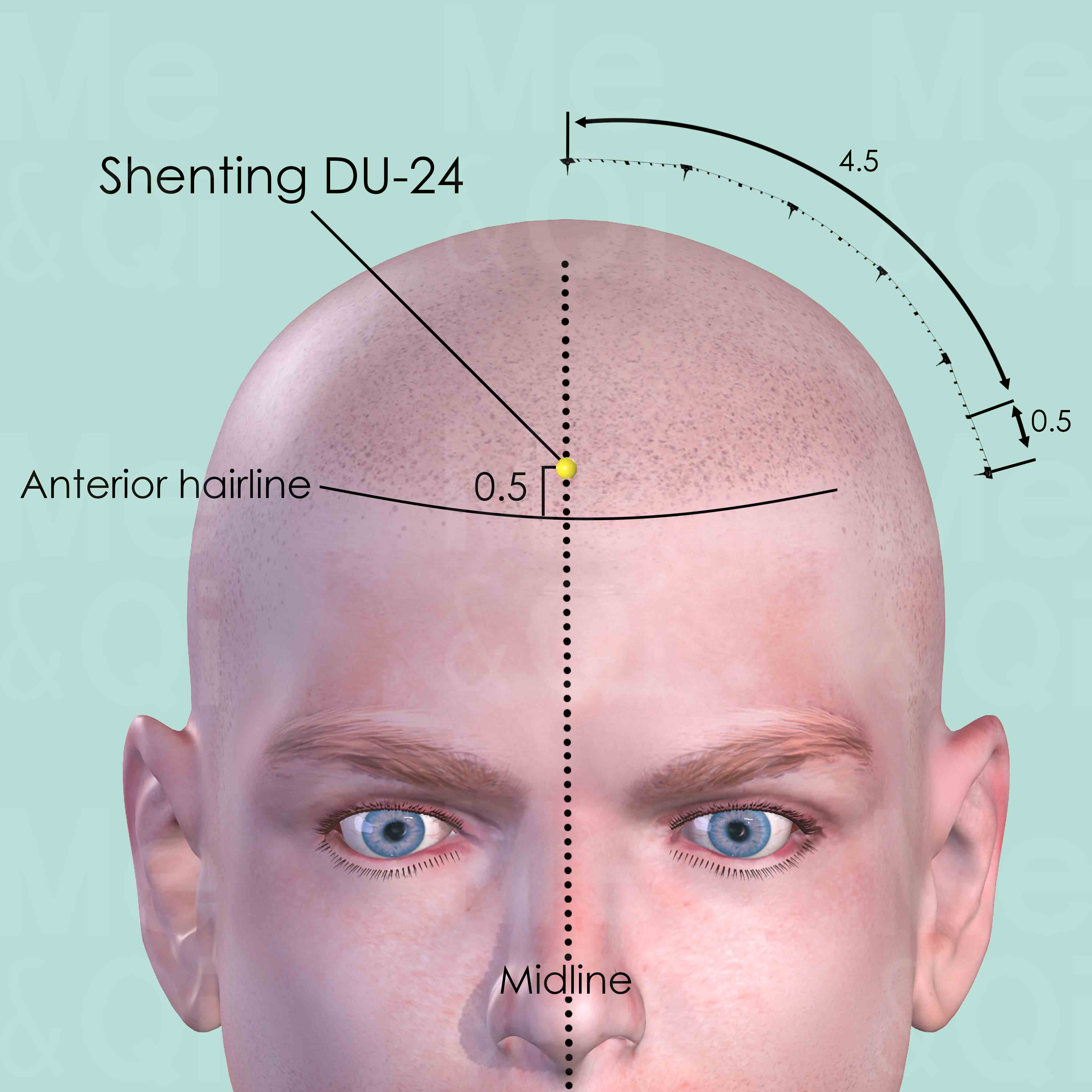Poor Memoryaccording to TCM
Symptom family: Memory Disorders
Did you mean? Amnesia
Root Causes of Poor Memory in TCM
Explore below more details about what might cause Poor memory according to TCM.
- By Syndrome
- By Organ
- Blood Deficiency
- Yin Deficiency
- Qi Deficiency
- Wind
- Yang Excess
- Yang Deficiency
- Essence Deficiency
- Cold
- Heat
- View More Causes
- Heart
- Kidney
- Spleen
- Liver
- Bladder
- Pericardium
- View More Organs
Blood Deficiency
Blood Deficiency in TCM is like when your body's tank runs low on the vital energy that blood provides. It's not exactly the same as anemia in modern medicine, which is about having too few red blood cells. Instead, Blood Deficiency in TCM is about your body not having enough of the life-giving qualities that blood brings, like nourishment and moisture. This can make you feel tired, look pale, and even feel dizzy or have blurry vision. It's like a garden not getting enough water to stay lush and vibrant. TCM sees this as an imbalance where the body isn't being nourished as it should be, impacting overall health and well-being.... see more
Blood Deficiency Patterns That Can Lead to Poor Memory
Common Symptoms: Palpitations Insomnia Dizziness Scanty Menstruation Pale Lips Generalized Fatigue Anxiety Vivid Dreaming
| Pattern Name | Relevant Symptoms | Relevant Formulas |
|---|---|---|
| Qi and Blood Deficiency | Poor memory, General weakness, Generalized fatigue, Weak voice, Pale face, Shortness of breath, Palpitations, Dizziness, Insomnia, Reluctance to speak, Lack of appetite, Limb numbness, Skin numbness... see more | Gui Pi Tang | Ren Shen Yang Rong Tang | Shi Quan Da Bu Tang | Bu Zhong Yi Qi Tang | Ba Zhen Tang | Guo Qi Yin | Zhi Gan Cao Tang |
| Blood Deficiency | Poor memory, Dizziness, Scanty menstruation, Amenorrhea, Dull shallow face, Pale lips, Insomnia... see more | Si Wu Tang | Dang Gui Bu Xue Tang | Ren Shen Zi Xie Tang |
| Heart Blood Deficiency | Poor memory, Easily startled, Vivid dreaming | Gui Pi Tang | Si Wu Tang | Shen Qi Si Wu Tang | Bai Zi Yang Xin Tang 1 | Gan Mai Da Zao Tang | Suan Zao Ren Tang | Zhen Xin An Shen Tang |
| Liver and Heart Blood Deficiency | Poor memory, Palpitations, Dizziness, Insomnia, Vivid dreaming, Anxiety, Easily startled, Dull pale complexion, Pale lips, Blurry vision, Eye floaters, Night blindness, Tingling of limbs, Limb numbness, Scanty menstruation, Amenorrhea, Muscle cramps, Muscle weakness, Dry hair, Skin dryness, Depression, Lack of direction, Withered and brittle nails... see more | Gui Pi Tang | Suan Zao Ren Tang | Sheng Yu Tang | Zhen Zhu Mu Wan |
| Liver Wind agitating Internally due to Liver Blood Deficiency | Poor memory, Fine tremor, Facial tic, Dizziness, Blurry vision, Limb numbness, Tingling of limbs, Insomnia, Scanty menstruation... see more | Si Wu Tang | E Jiao Ji Zi Huang Tang | Bu Gan Tang |
| Pericardium Blood Deficiency | Poor memory, Chest distension, Chest stiffness, Chest pain, Palpitations, Insomnia | Shen Qi Si Wu Tang |
| Spleen and Heart Blood Deficiency | Poor memory, Palpitations, Dizziness, Insomnia, Vivid dreaming, Anxiety, Easily startled, Dull pale complexion, Pale lips, Generalized fatigue, Muscle weakness, Diarrhea, Lack of appetite, Scanty menstruation... see more | Gui Pi Tang |
| Heart and Spleen Deficiency | Forgetfulness, Poor memory, Palpitations, Insomnia, Lack of appetite, Generalized fatigue, Anxiety, Pale face, Diarrhea, Scanty menstruation, Pale lips, Dizziness... see more | Gui Pi Tang |
| Heart and Spleen Qi and Blood Deficiency | Forgetfulness, Palpitations, Poor memory, Restless sleeplessness, Fever, Lack of appetite, Generalized fatigue, Coughing, Shortness of breath, Exertional dyspnea, Weight loss... see more | Ren Shen Yang Rong Tang |
| Yin and Blood Deficiency | Forgetfulness, Irritability, Heart palpitations with anxiety, Generalized fatigue, Restless sleeplessness, Poor concentration, Nocturnal emission, Poor memory, Dry stools, Mouth ulcers, Menopausal symptoms... see more | Tian Wang Bu Xin Dan |
Yin Deficiency
Yin deficiency in TCM is a pattern of disharmony characterized by a depletion of the body's Yin energy, which represents the cooling, moistening, and nurturing aspects of our physiology. This condition often arises from factors like chronic stress, overwork, insufficient rest, or prolonged illness. Symptoms of Yin deficiency can include a sensation of heat, especially in the afternoon or evening, night sweats, insomnia, a dry mouth or throat, and a red tongue with little coating. There might also be a general feeling of restlessness or irritability. Since Yin is essential for balancing the body's active and warm Yang energy, its deficiency leads to a relative excess of Yang, manifesting as heat or dryness symptoms.... see more
Yin Deficiency Patterns That Can Lead to Poor Memory
Common Symptoms: Night Sweats Insomnia Anxiety Restlessness Dizziness Nocturnal Emission Dry Stools Flushed Cheekbones
| Pattern Name | Relevant Symptoms | Relevant Formulas |
|---|---|---|
| Heart Yin Deficiency | Poor memory, Night sweats, Feeling of uneasiness, Feeling hot, Heat sensation in palms | Tian Wang Bu Xin Dan |
| Kidney Yin Deficiency | Poor memory, Perspiration, Back pain, Hearing loss, Dry mouth and throat at night, Lower back pain, Constipation, Scanty and dark urine, Infertility, Premature ejaculation, Generalized fatigue, General weakness, Depression, Anxiety, Heat sensation in palms, Evening heat sensation, Flushed cheekbones, Menopausal hot flashes, Preference for sipping, Evening anxiety... see more | Bai Zi Yang Xin Tang 2 | Liu Wei Di Huang Wan | Zuo Gui Wan | Qi Bao Mei Ran Dan | Zhi Bo Di Huang Wan |
| Yin Deficiency | Poor memory, Heat sensation in palms, Emaciation, Sore throat at night, Thirst, Anxiety, Jumpy, Scanty and dark urine, Dry stools, Dry mouth and throat at night, Nocturnal emission, Pain relieved by pressure and cold, Preference for sipping... see more | Liu Wei Di Huang Wan | Zuo Gui Wan | Mu Li San |
| Yin and Blood Deficiency | Forgetfulness, Irritability, Heart palpitations with anxiety, Generalized fatigue, Restless sleeplessness, Poor concentration, Nocturnal emission, Poor memory, Dry stools, Mouth ulcers, Menopausal symptoms... see more | Tian Wang Bu Xin Dan |
| Heart and Kidney Yin Deficiency | Poor memory, Palpitations, Insomnia, Night sweats, Anxiety, Tinnitus, Dizziness, Vivid dreaming, Restlessness, Nocturnal emission... see more | Tian Wang Bu Xin Dan | Jiao Tai Wan | Ci Zhu Wan |
| Disharmony between Heart and Kidneys | Poor memory, Dizziness, Tinnitus, Insomnia, Palpitations, Lower back pain, Knee pain, Night sweats, Constipation, Menopausal hot flashes, Blurry vision... see more | Tian Wang Bu Xin Dan | Liu Wei Di Huang Wan |
Qi Deficiency
Qi Deficiency in TCM is like running low on battery power. Qi is the vital energy that powers every function in your body. When there's a Qi Deficiency, it means your body doesn't have enough of this essential energy. This can make you feel tired all the time, weak, or even cause shortness of breath. It's similar to how you feel when you haven't had enough sleep or nutritious food. Your body just doesn't have the energy it needs to perform at its best. Unlike modern medicine, which often focuses on specific physical causes for fatigue and weakness, TCM views Qi Deficiency as an overall energy depletion that affects your entire well-being, and it seeks to replenish and balance this vital energy.... see more
Qi Deficiency Patterns That Can Lead to Poor Memory
Common Symptoms: Palpitations Lack Of Appetite Generalized Fatigue Mental Exhaustion Anemia Insomnia Anxiety Pale Face
| Pattern Name | Relevant Symptoms | Relevant Formulas |
|---|---|---|
| Qi and Blood Deficiency | Poor memory, General weakness, Generalized fatigue, Weak voice, Pale face, Shortness of breath, Palpitations, Dizziness, Insomnia, Reluctance to speak, Lack of appetite, Limb numbness, Skin numbness... see more | Gui Pi Tang | Ren Shen Yang Rong Tang | Shi Quan Da Bu Tang | Bu Zhong Yi Qi Tang | Ba Zhen Tang | Guo Qi Yin | Zhi Gan Cao Tang |
| Heart and Spleen Deficiency | Forgetfulness, Poor memory, Palpitations, Insomnia, Lack of appetite, Generalized fatigue, Anxiety, Pale face, Diarrhea, Scanty menstruation, Pale lips, Dizziness... see more | Gui Pi Tang |
| Heart and Spleen Qi and Blood Deficiency | Forgetfulness, Palpitations, Poor memory, Restless sleeplessness, Fever, Lack of appetite, Generalized fatigue, Coughing, Shortness of breath, Exertional dyspnea, Weight loss... see more | Ren Shen Yang Rong Tang |
Wind
In TCM "Wind" is a concept that represents a pattern of disharmony, often characterized by its sudden and unpredictable nature, much like a gusty wind changing direction without warning. This pattern is associated with symptoms that come and go quickly or move around the body, such as itching, tremors, or even certain types of pain. Wind is considered to be a primary cause of illnesses that have these rapidly changing characteristics. In TCM, external Wind often refers to illnesses that start suddenly, like the common cold, believed to be caused by external pathogenic factors like climatic changes. On the other hand, internal Wind can be linked to internal imbalances and can manifest in conditions like dizziness or spasms. ... see more
Wind Patterns That Can Lead to Poor Memory
Common Symptoms: Dizziness Headaches Limb Numbness Insomnia Dry Throat Blurry Vision Convulsions Coma
| Pattern Name | Relevant Symptoms | Relevant Formulas |
|---|---|---|
| Interior Wind | Poor memory, Convulsions, Hand tremor, Dizziness, Paralysis, Coma, Tic disorder, Mouth deviation, Eye deviation, Tremors, Headaches, Limb numbness... see more | Si Wu Tang | Tian Ma Gou Teng Yin | Ling Jiao Gou Teng Tang | Liu Wei Di Huang Wan | Qi Ju Di Huang Wan | E Jiao Ji Zi Huang Tang | Zhen Gan Xi Feng Tang | Bu Gan Tang |
| Liver Wind agitating Internally due to Liver Blood Deficiency | Poor memory, Fine tremor, Facial tic, Dizziness, Blurry vision, Limb numbness, Tingling of limbs, Insomnia, Scanty menstruation... see more | Si Wu Tang | E Jiao Ji Zi Huang Tang | Bu Gan Tang |
| Liver Wind agitating Internally due to Liver Yang Rising | Poor memory, Tremors, Facial tic, Severe dizziness, Tinnitus, Headaches, Hypertension, Dry throat, Dry eyes, Blurry vision, Limb numbness, Tingling of limbs, Back pain, Oliguria, Night sweats... see more | Liu Wei Di Huang Wan | Qi Ju Di Huang Wan | E Jiao Ji Zi Huang Tang | Zhen Gan Xi Feng Tang | Feng Yin Tang |
Yang Excess
Yang Excess in TCM refers to a state where there is an overabundance of Yang energy, leading to symptoms of heat and hyperactivity in the body. This pattern of disharmony often arises from factors like stress, excessive physical activity, overconsumption of spicy or heating foods, or an internal imbalance that causes Yang to flare up. Symptoms of Yang Excess include a feeling of heat, red face, irritability, restlessness, thirst, constipation, and a rapid, forceful pulse. Treatment in TCM for Yang Excess aims to cool down and subdue the excessive Yang while nurturing Yin energy to restore balance.... see more
Yang Excess Patterns That Can Lead to Poor Memory
Common Symptoms: Dizziness Neuroses Confusion Urinary Or Fecal Incontinence Lower Back Pain White Urethral Discharge Chills Frequent Urination
| Pattern Name | Relevant Symptoms | Relevant Formulas |
|---|---|---|
| Liver Wind agitating Internally due to Liver Yang Rising | Poor memory, Tremors, Facial tic, Severe dizziness, Tinnitus, Headaches, Hypertension, Dry throat, Dry eyes, Blurry vision, Limb numbness, Tingling of limbs, Back pain, Oliguria, Night sweats... see more | Liu Wei Di Huang Wan | Qi Ju Di Huang Wan | E Jiao Ji Zi Huang Tang | Zhen Gan Xi Feng Tang | Feng Yin Tang |
| Bladder Deficiency with Cold | Forgetfulness, Confusion, Poor memory, Urinary or fecal incontinence, Lower back pain, Dizziness, White urethral discharge, Chills, Frequent urination, Cloudy urine, Pediatric nocturnal enuresis... see more | Sang Piao Xiao San |
Yang Deficiency
Yang deficiency in TCM refers to a state where the body's Yang energy, which is responsible for warmth, activity, and function, is weakened or diminished. This pattern of disharmony often arises from chronic illness, aging, or inherent constitutional weakness. Symptoms of Yang deficiency are typically associated with cold and sluggishness, such as a feeling of coldness, cold extremities, pale complexion, low energy or fatigue, and a desire for warmth. Digestive issues like poor appetite, loose stools, and water retention can also be indicative of Yang deficiency.... see more
Yang Deficiency Patterns That Can Lead to Poor Memory
| Pattern Name | Relevant Symptoms | Relevant Formulas |
|---|---|---|
| Kidney Yang Deficiency | Poor memory, Lower back pain, Dizziness, Tinnitus, Weak and cold knees, Lower back coldness, Chills, Weak legs, Bright pale face, Generalized fatigue, General weakness, Leg edema, Female infertility, Diarrhea, Depression, Erectile dysfunction, Premature ejaculation, Oligospermia, Low sex drive, Pale and abudant urination... see more | Er Xian Tang |
Essence Deficiency
In TCM "Essence" (Jing) deficiency refers to a depletion of the body's fundamental substance, which is vital for growth, development, reproduction, and overall vitality. Jing, often translated as "Essence," is a unique concept in TCM, seen as the basis of all life activities and inherited from our parents. Essence deficiency manifests in various symptoms, such as chronic fatigue, weakness, slow physical or mental development, fertility issues, premature aging, weak bones, and a lackluster complexion. It can also affect the hair, leading to premature greying or hair loss. This pattern of disharmony often arises from congenital factors, chronic illness, overwork, or excessive behaviors that drain the body's resources. ... see more
Essence Deficiency Patterns That Can Lead to Poor Memory
| Pattern Name | Relevant Symptoms | Relevant Formulas |
|---|---|---|
| Kidney Essence Deficiency | Poor memory, Deafness, Decreased mental sharpness, Intellectual disability, Osteomalacia, Hair loss, Lower back pain, Infertility, Primary amenorrhea, Dizziness, Blurry vision, Absentmindness... see more | Zuo Gui Wan | Wu Zi Yan Zong Wan | Tu Si Zi Wan | Qi Bao Mei Ran Dan |
Cold
In TCM "Cold" as a pattern of disharmony refers to a specific type of imbalance within the body's systems, often linked to a deficiency or weakness. It's not about feeling physically cold or having a common cold, but rather a metaphorical description of certain symptoms and underlying conditions. When a TCM practitioner says someone suffers from "Cold," it usually implies that the body's Yang energy, which is warm and active, is insufficient or overpowered by Yin energy, which is cool and passive. Symptoms of Cold in TCM can include a general feeling of coldness, cold limbs, pale complexion, low energy, slow metabolism, and a preference for warmth. ... see more
Cold Patterns That Can Lead to Poor Memory
| Pattern Name | Relevant Symptoms | Relevant Formulas |
|---|---|---|
| Bladder Deficiency with Cold | Forgetfulness, Confusion, Poor memory, Urinary or fecal incontinence, Lower back pain, Dizziness, White urethral discharge, Chills, Frequent urination, Cloudy urine, Pediatric nocturnal enuresis... see more | Sang Piao Xiao San |
Heat
In TCM "Heat" signifies an excess of Yang energy, leading to an imbalance where heat predominates over the body's cool Yin aspects. This condition is metaphorically akin to an internal over-heating. Symptoms indicative of Heat can include feelings of warmth, fever, sweating, irritability, red face, thirst with a preference for cold drinks, and a rapid pulse. The tongue may appear red with a yellow coating. Unlike the common interpretation of heat in terms of temperature, in TCM, it represents a state of hyperactivity or inflammation in the body.... see more
Heat Patterns That Can Lead to Poor Memory
| Pattern Name | Relevant Symptoms | Relevant Formulas |
|---|---|---|
| Disharmony between Heart and Kidneys | Poor memory, Dizziness, Tinnitus, Insomnia, Palpitations, Lower back pain, Knee pain, Night sweats, Constipation, Menopausal hot flashes, Blurry vision... see more | Tian Wang Bu Xin Dan | Liu Wei Di Huang Wan |
Heart
In TCM the Heart is considered the "emperor" of all organs, primarily responsible for governing Blood and housing the mind, known as "Shen." It plays a crucial role in maintaining mental-emotional equilibrium and controlling the circulation of Qi and blood throughout the body. When the Heart is imbalanced or malfunctions in TCM, it can lead to a range of issues like heart palpitations, insomnia, dream-disturbed sleep, anxiety, and a flushed complexion. Emotional disturbances such as excessive joy or lack of joy are also seen as signs of Heart disharmony. These symptoms reflect not just physical heart conditions but also the state of one's Shen, indicating the interconnectedness of physical and emotional well-being in TCM.... see more
Heart Patterns That Can Lead to Poor Memory
Common Symptoms: Palpitations Insomnia Anxiety Dizziness Vivid Dreaming Restlessness Generalized Fatigue Pale Lips
| Pattern Name | Relevant Symptoms | Relevant Formulas |
|---|---|---|
| Heart Yin Deficiency | Poor memory, Night sweats, Feeling of uneasiness, Feeling hot, Heat sensation in palms | Tian Wang Bu Xin Dan |
| Heart Blood Deficiency | Poor memory, Easily startled, Vivid dreaming | Gui Pi Tang | Si Wu Tang | Shen Qi Si Wu Tang | Bai Zi Yang Xin Tang 1 | Gan Mai Da Zao Tang | Suan Zao Ren Tang | Zhen Xin An Shen Tang |
| Kidneys And Heart Not Harmonized | Poor memory, Palpitations, Restlessness, Insomnia, Vivid dreaming, Anxiety, Dizziness, Tinnitus, Hearing loss, Lower back pain, Nocturnal emissions with dreams, Evening heat sensation, Dry mouth and throat at night, Preference for sipping, Night sweats, Heat sensation in palms, Scanty and dark urine, Dry stools... see more | Tian Wang Bu Xin Dan | Jiao Tai Wan | Qing Xin Lian Zi Yin |
| Liver and Heart Blood Deficiency | Poor memory, Palpitations, Dizziness, Insomnia, Vivid dreaming, Anxiety, Easily startled, Dull pale complexion, Pale lips, Blurry vision, Eye floaters, Night blindness, Tingling of limbs, Limb numbness, Scanty menstruation, Amenorrhea, Muscle cramps, Muscle weakness, Dry hair, Skin dryness, Depression, Lack of direction, Withered and brittle nails... see more | Gui Pi Tang | Suan Zao Ren Tang | Sheng Yu Tang | Zhen Zhu Mu Wan |
| Spleen and Heart Blood Deficiency | Poor memory, Palpitations, Dizziness, Insomnia, Vivid dreaming, Anxiety, Easily startled, Dull pale complexion, Pale lips, Generalized fatigue, Muscle weakness, Diarrhea, Lack of appetite, Scanty menstruation... see more | Gui Pi Tang |
| Heart and Spleen Deficiency | Forgetfulness, Poor memory, Palpitations, Insomnia, Lack of appetite, Generalized fatigue, Anxiety, Pale face, Diarrhea, Scanty menstruation, Pale lips, Dizziness... see more | Gui Pi Tang |
| Heart and Spleen Qi and Blood Deficiency | Forgetfulness, Palpitations, Poor memory, Restless sleeplessness, Fever, Lack of appetite, Generalized fatigue, Coughing, Shortness of breath, Exertional dyspnea, Weight loss... see more | Ren Shen Yang Rong Tang |
| Heart and Kidney Yin Deficiency | Poor memory, Palpitations, Insomnia, Night sweats, Anxiety, Tinnitus, Dizziness, Vivid dreaming, Restlessness, Nocturnal emission... see more | Tian Wang Bu Xin Dan | Jiao Tai Wan | Ci Zhu Wan |
| Disharmony between Heart and Kidneys | Poor memory, Dizziness, Tinnitus, Insomnia, Palpitations, Lower back pain, Knee pain, Night sweats, Constipation, Menopausal hot flashes, Blurry vision... see more | Tian Wang Bu Xin Dan | Liu Wei Di Huang Wan |
Kidney
In TCM the Kidneys are regarded as the body's most fundamental reservoir of Essence, known as Jing, which influences growth, reproduction, and aging. They are not just organs for filtering blood, but a holistic system governing vital life forces. When the Kidneys malfunction in TCM, it can manifest as a variety of health issues, such as chronic fatigue, reproductive problems, imbalances in fluid metabolism leading to edema or dryness, lower back pain, and a sense of fear or insecurity.... see more
Kidney Patterns That Can Lead to Poor Memory
Common Symptoms: Tinnitus Dizziness Night Sweats Lower Back Pain Insomnia Anxiety Restlessness Palpitations
| Pattern Name | Relevant Symptoms | Relevant Formulas |
|---|---|---|
| Kidney Yang Deficiency | Poor memory, Lower back pain, Dizziness, Tinnitus, Weak and cold knees, Lower back coldness, Chills, Weak legs, Bright pale face, Generalized fatigue, General weakness, Leg edema, Female infertility, Diarrhea, Depression, Erectile dysfunction, Premature ejaculation, Oligospermia, Low sex drive, Pale and abudant urination... see more | Er Xian Tang |
| Kidney Essence Deficiency | Poor memory, Deafness, Decreased mental sharpness, Intellectual disability, Osteomalacia, Hair loss, Lower back pain, Infertility, Primary amenorrhea, Dizziness, Blurry vision, Absentmindness... see more | Zuo Gui Wan | Wu Zi Yan Zong Wan | Tu Si Zi Wan | Qi Bao Mei Ran Dan |
| Kidney Yin Deficiency | Poor memory, Perspiration, Back pain, Hearing loss, Dry mouth and throat at night, Lower back pain, Constipation, Scanty and dark urine, Infertility, Premature ejaculation, Generalized fatigue, General weakness, Depression, Anxiety, Heat sensation in palms, Evening heat sensation, Flushed cheekbones, Menopausal hot flashes, Preference for sipping, Evening anxiety... see more | Bai Zi Yang Xin Tang 2 | Liu Wei Di Huang Wan | Zuo Gui Wan | Qi Bao Mei Ran Dan | Zhi Bo Di Huang Wan |
| Kidneys And Heart Not Harmonized | Poor memory, Palpitations, Restlessness, Insomnia, Vivid dreaming, Anxiety, Dizziness, Tinnitus, Hearing loss, Lower back pain, Nocturnal emissions with dreams, Evening heat sensation, Dry mouth and throat at night, Preference for sipping, Night sweats, Heat sensation in palms, Scanty and dark urine, Dry stools... see more | Tian Wang Bu Xin Dan | Jiao Tai Wan | Qing Xin Lian Zi Yin |
| Heart and Kidney Yin Deficiency | Poor memory, Palpitations, Insomnia, Night sweats, Anxiety, Tinnitus, Dizziness, Vivid dreaming, Restlessness, Nocturnal emission... see more | Tian Wang Bu Xin Dan | Jiao Tai Wan | Ci Zhu Wan |
| Disharmony between Heart and Kidneys | Poor memory, Dizziness, Tinnitus, Insomnia, Palpitations, Lower back pain, Knee pain, Night sweats, Constipation, Menopausal hot flashes, Blurry vision... see more | Tian Wang Bu Xin Dan | Liu Wei Di Huang Wan |
Spleen
In TCM the Spleen plays a vital role in digestion and transformation, converting food into energy and nutrients, and overseeing the distribution of Qi and Blood. It's also crucial in maintaining the health of muscles and limbs and ensuring the blood remains within the vessels. When the Spleen malfunctions in TCM, it can lead to a variety of issues such as digestive disorders, fatigue, weak muscles, bloating, and a feeling of heaviness. It can also cause a pale complexion, poor appetite, and a tendency to bruise easily. Emotionally, a Spleen imbalance is often associated with excessive worry or overthinking, reflecting its role in the interplay between physical and mental health.... see more
Spleen Patterns That Can Lead to Poor Memory
Common Symptoms: Palpitations Lack Of Appetite Generalized Fatigue Insomnia Anxiety Diarrhea Scanty Menstruation Pale Lips
| Pattern Name | Relevant Symptoms | Relevant Formulas |
|---|---|---|
| Spleen and Heart Blood Deficiency | Poor memory, Palpitations, Dizziness, Insomnia, Vivid dreaming, Anxiety, Easily startled, Dull pale complexion, Pale lips, Generalized fatigue, Muscle weakness, Diarrhea, Lack of appetite, Scanty menstruation... see more | Gui Pi Tang |
| Heart and Spleen Deficiency | Forgetfulness, Poor memory, Palpitations, Insomnia, Lack of appetite, Generalized fatigue, Anxiety, Pale face, Diarrhea, Scanty menstruation, Pale lips, Dizziness... see more | Gui Pi Tang |
| Heart and Spleen Qi and Blood Deficiency | Forgetfulness, Palpitations, Poor memory, Restless sleeplessness, Fever, Lack of appetite, Generalized fatigue, Coughing, Shortness of breath, Exertional dyspnea, Weight loss... see more | Ren Shen Yang Rong Tang |
Liver
In TCM the Liver is viewed as the organ responsible for the smooth flow of Qi, Blood, and emotions throughout the body. It plays a key role in regulating mood, storing blood, supporting digestion, and ensuring the health of tendons and eyes. When the Liver malfunctions or is imbalanced in TCM, it can lead to a range of issues such as irritability, mood swings, menstrual irregularities, eye problems, and muscular stiffness or pain. A malfunctioning Liver in TCM reflects not only physical disturbances but also emotional and mental disharmony, emphasizing the holistic approach of TCM in addressing health and wellness.... see more
Liver Patterns That Can Lead to Poor Memory
Common Symptoms: Dizziness Insomnia Blurry Vision Tingling Of Limbs Limb Numbness Vivid Dreaming Scanty Menstruation Amenorrhea
| Pattern Name | Relevant Symptoms | Relevant Formulas |
|---|---|---|
| Liver and Heart Blood Deficiency | Poor memory, Palpitations, Dizziness, Insomnia, Vivid dreaming, Anxiety, Easily startled, Dull pale complexion, Pale lips, Blurry vision, Eye floaters, Night blindness, Tingling of limbs, Limb numbness, Scanty menstruation, Amenorrhea, Muscle cramps, Muscle weakness, Dry hair, Skin dryness, Depression, Lack of direction, Withered and brittle nails... see more | Gui Pi Tang | Suan Zao Ren Tang | Sheng Yu Tang | Zhen Zhu Mu Wan |
| Liver Wind agitating Internally due to Liver Blood Deficiency | Poor memory, Fine tremor, Facial tic, Dizziness, Blurry vision, Limb numbness, Tingling of limbs, Insomnia, Scanty menstruation... see more | Si Wu Tang | E Jiao Ji Zi Huang Tang | Bu Gan Tang |
| Liver Wind agitating Internally due to Liver Yang Rising | Poor memory, Tremors, Facial tic, Severe dizziness, Tinnitus, Headaches, Hypertension, Dry throat, Dry eyes, Blurry vision, Limb numbness, Tingling of limbs, Back pain, Oliguria, Night sweats... see more | Liu Wei Di Huang Wan | Qi Ju Di Huang Wan | E Jiao Ji Zi Huang Tang | Zhen Gan Xi Feng Tang | Feng Yin Tang |
Bladder
In TCM the Bladder plays a crucial role beyond its basic function of storing and excreting urine. It is intimately connected with the Kidney system, helping to regulate the body's water balance and being a key component in the processing and elimination of fluids. The Bladder also influences the lower part of the body and the back. When it malfunctions or is imbalanced in TCM, it can lead to urinary issues like frequent urination, incontinence, or painful urination. Additionally, there may be problems related to its meridian pathway, such as lower back pain, stiffness, or weakness in the legs. The Bladder’s condition in TCM can also reflect emotional states, with imbalances potentially leading to feelings of fear or anxiety.... see more
Bladder Patterns That Can Lead to Poor Memory
| Pattern Name | Relevant Symptoms | Relevant Formulas |
|---|---|---|
| Bladder Deficiency with Cold | Forgetfulness, Confusion, Poor memory, Urinary or fecal incontinence, Lower back pain, Dizziness, White urethral discharge, Chills, Frequent urination, Cloudy urine, Pediatric nocturnal enuresis... see more | Sang Piao Xiao San |
Pericardium
In TCM the Pericardium is more than a physical membrane protecting the heart; it's considered an organ system that acts as the "Heart's protector." It plays a crucial role in safeguarding the heart from external pathogenic factors and emotional disturbances. The Pericardium is also involved in regulating blood circulation and influencing emotional well-being, especially in terms of relationships and intimacy. When the Pericardium malfunctions or is imbalanced in TCM, it can lead to symptoms that mirror heart issues, such as chest pain or palpitations, but often with an emotional component like difficulty in forming emotional connections or excessive vulnerability to external stressors. Additionally, a disturbed Pericardium can result in sleep disturbances, anxiety, and in severe cases, mental confusion, reflecting its integral role in both physical heart protection and emotional balance.... see more
Pericardium Patterns That Can Lead to Poor Memory
| Pattern Name | Relevant Symptoms | Relevant Formulas |
|---|---|---|
| Pericardium Blood Deficiency | Poor memory, Chest distension, Chest stiffness, Chest pain, Palpitations, Insomnia | Shen Qi Si Wu Tang |
TCM Herbal Formulas for Poor Memory
Explore below some TCM herbal formulas used to address poor memory, organized by cause and by formula type.
- By Cause
- By Formula Type
- Blood Deficiency
- Yin Deficiency
- Qi Deficiency
- Wind
- Yang Excess
- Yang Deficiency
- Essence Deficiency
- Cold
- Heat
- View More Causes
- Formulas that nourish the heart and calm the mind
- Formulas that tonify blood
- Formulas that pacify and extinguish internal wind
- Formulas that nourish yin and tonify
- Formulas that tonify qi and blood
- Formulas that tonify yin and yang
- Formulas that sedate and calm the mind
- Formulas that warm yang and tonify
- Formulas that tonify
- Formulas that secure essence and stop enuresis
- Formulas that tonify qi
- Formulas that clear heat from the organs
- Formulas that dredge and disperse external wind
- Formulas that stabilize exterior and stop sweating
Top Formula for Blood Deficiency:
Gui Pi Tang
Suitable for Blood Deficiency patterns that may cause poor memory, such as Heart and Spleen Deficiency or Qi and Blood Deficiency
Learn moreAll Formulas Recommended for Poor Memory Caused by Blood Deficiency
| Formula | Patterns Suitable For |
|---|---|
| Gui Pi Tang | Heart and Spleen Deficiency, Qi and Blood Deficiency, Heart Blood Deficiency, Liver and Heart Blood Deficiency, Spleen and Heart Blood Deficiency... see more |
| Si Wu Tang | Blood Deficiency, Heart Blood Deficiency, Liver Wind agitating Internally due to Liver Blood Deficiency... see more |
| Ren Shen Yang Rong Tang | Heart and Spleen Qi and Blood Deficiency, Qi and Blood Deficiency |
| Shen Qi Si Wu Tang | Heart Blood Deficiency, Pericardium Blood Deficiency |
| Suan Zao Ren Tang | Heart Blood Deficiency, Liver and Heart Blood Deficiency |
| Tian Wang Bu Xin Dan | Yin and Blood Deficiency |
| E Jiao Ji Zi Huang Tang | Liver Wind agitating Internally due to Liver Blood Deficiency |
| Bu Gan Tang | Liver Wind agitating Internally due to Liver Blood Deficiency |
| Shi Quan Da Bu Tang | Qi and Blood Deficiency |
| Bu Zhong Yi Qi Tang | Qi and Blood Deficiency |
| Ba Zhen Tang | Qi and Blood Deficiency |
| Guo Qi Yin | Qi and Blood Deficiency |
| Zhi Gan Cao Tang | Qi and Blood Deficiency |
| Dang Gui Bu Xue Tang | Blood Deficiency |
| Ren Shen Zi Xie Tang | Blood Deficiency |
| Bai Zi Yang Xin Tang 1 | Heart Blood Deficiency |
| Gan Mai Da Zao Tang | Heart Blood Deficiency |
| Zhen Xin An Shen Tang | Heart Blood Deficiency |
| Sheng Yu Tang | Liver and Heart Blood Deficiency |
| Zhen Zhu Mu Wan | Liver and Heart Blood Deficiency |
Top Formula for Yin Deficiency:
Tian Wang Bu Xin Dan
Suitable for Yin Deficiency patterns that may cause poor memory, such as Yin and Blood Deficiency or Heart Yin Deficiency
Learn moreAll Formulas Recommended for Poor Memory Caused by Yin Deficiency
| Formula | Patterns Suitable For |
|---|---|
| Tian Wang Bu Xin Dan | Yin and Blood Deficiency, Heart Yin Deficiency, Heart and Kidney Yin Deficiency, Disharmony between Heart and Kidneys... see more |
| Liu Wei Di Huang Wan | Kidney Yin Deficiency, Disharmony between Heart and Kidneys, Yin Deficiency |
| Zuo Gui Wan | Kidney Yin Deficiency, Yin Deficiency |
| Jiao Tai Wan | Heart and Kidney Yin Deficiency |
| Qi Bao Mei Ran Dan | Kidney Yin Deficiency |
| Ci Zhu Wan | Heart and Kidney Yin Deficiency |
| Bai Zi Yang Xin Tang 2 | Kidney Yin Deficiency |
| Zhi Bo Di Huang Wan | Kidney Yin Deficiency |
| Mu Li San | Yin Deficiency |
Top Formula for Qi Deficiency:
Gui Pi Tang
Suitable for Qi Deficiency patterns that may cause poor memory, such as Heart and Spleen Deficiency or Qi and Blood Deficiency
Learn moreAll Formulas Recommended for Poor Memory Caused by Qi Deficiency
| Formula | Patterns Suitable For |
|---|---|
| Gui Pi Tang | Heart and Spleen Deficiency, Qi and Blood Deficiency |
| Ren Shen Yang Rong Tang | Heart and Spleen Qi and Blood Deficiency, Qi and Blood Deficiency |
| Shi Quan Da Bu Tang | Qi and Blood Deficiency |
| Bu Zhong Yi Qi Tang | Qi and Blood Deficiency |
| Ba Zhen Tang | Qi and Blood Deficiency |
| Guo Qi Yin | Qi and Blood Deficiency |
| Zhi Gan Cao Tang | Qi and Blood Deficiency |
Top Formula for Wind:
E Jiao Ji Zi Huang Tang
Suitable for Wind patterns that may cause poor memory, such as Interior Wind or Liver Wind agitating Internally due to Liver Blood Deficiency
Learn moreAll Formulas Recommended for Poor Memory Caused by Wind
| Formula | Patterns Suitable For |
|---|---|
| E Jiao Ji Zi Huang Tang | Interior Wind, Liver Wind agitating Internally due to Liver Blood Deficiency, Liver Wind agitating Internally due to Liver Yang Rising... see more |
| Liu Wei Di Huang Wan | Interior Wind, Liver Wind agitating Internally due to Liver Yang Rising |
| Si Wu Tang | Interior Wind, Liver Wind agitating Internally due to Liver Blood Deficiency |
| Qi Ju Di Huang Wan | Interior Wind, Liver Wind agitating Internally due to Liver Yang Rising |
| Zhen Gan Xi Feng Tang | Interior Wind, Liver Wind agitating Internally due to Liver Yang Rising |
| Bu Gan Tang | Interior Wind, Liver Wind agitating Internally due to Liver Blood Deficiency |
| Tian Ma Gou Teng Yin | Interior Wind |
| Ling Jiao Gou Teng Tang | Interior Wind |
| Feng Yin Tang | Liver Wind agitating Internally due to Liver Yang Rising |
Top Formula for Yang Excess:
Liu Wei Di Huang Wan
Suitable for Yang Excess patterns that may cause poor memory, such as Liver Wind agitating Internally due to Liver Yang Rising
Learn moreAll Formulas Recommended for Poor Memory Caused by Yang Excess
| Formula | Patterns Suitable For |
|---|---|
| Liu Wei Di Huang Wan | Liver Wind agitating Internally due to Liver Yang Rising |
| E Jiao Ji Zi Huang Tang | Liver Wind agitating Internally due to Liver Yang Rising |
| Qi Ju Di Huang Wan | Liver Wind agitating Internally due to Liver Yang Rising |
| Zhen Gan Xi Feng Tang | Liver Wind agitating Internally due to Liver Yang Rising |
| Sang Piao Xiao San | Bladder Deficiency with Cold |
| Feng Yin Tang | Liver Wind agitating Internally due to Liver Yang Rising |
Top Formula for Yang Deficiency:
Er Xian Tang
Suitable for Yang Deficiency patterns that may cause poor memory, such as Kidney Yang Deficiency
Learn moreTop Formula for Essence Deficiency:
Zuo Gui Wan
Suitable for Essence Deficiency patterns that may cause poor memory, such as Kidney Essence Deficiency
Learn moreAll Formulas Recommended for Poor Memory Caused by Essence Deficiency
| Formula | Patterns Suitable For |
|---|---|
| Zuo Gui Wan | Kidney Essence Deficiency |
| Qi Bao Mei Ran Dan | Kidney Essence Deficiency |
| Wu Zi Yan Zong Wan | Kidney Essence Deficiency |
| Tu Si Zi Wan | Kidney Essence Deficiency |
Top Formula for Cold:
Sang Piao Xiao San
Suitable for Cold patterns that may cause poor memory, such as Bladder Deficiency with Cold
Learn moreTop Formula for Heat:
Tian Wang Bu Xin Dan
Suitable for Heat patterns that may cause poor memory, such as Disharmony between Heart and Kidneys
Learn moreAll Formulas Recommended for Poor Memory Caused by Heat
| Formula | Patterns Suitable For |
|---|---|
| Tian Wang Bu Xin Dan | Disharmony between Heart and Kidneys |
| Liu Wei Di Huang Wan | Disharmony between Heart and Kidneys |
Formulas that nourish the Heart and calm the Mind
These formulas are suitable for some poor memory-causing patterns like Yin and Blood Deficiency or Heart Yin Deficiency.
One such formula is Tian Wang Bu Xin Dan, with unprepared rehmannia as a key herb.
Other formulas of this category are listed in the table below.
All "formulas that nourish the heart and calm the mind" recommended for poor memory
| Formula | Patterns Suitable For (if applicable) |
|---|---|
| Tian Wang Bu Xin Dan | Yin and Blood Deficiency, Heart Yin Deficiency, Heart and Kidney Yin Deficiency, Kidneys And Heart Not Harmonized, Disharmony between Heart and Kidneys... see more |
| Jiao Tai Wan | Heart and Kidney Yin Deficiency, Kidneys And Heart Not Harmonized |
| Suan Zao Ren Tang | Heart Blood Deficiency, Liver and Heart Blood Deficiency |
| Bai Zi Yang Xin Tang 2 | Kidney Yin Deficiency |
| Bai Zi Yang Xin Tang 1 | Heart Blood Deficiency |
| Gan Mai Da Zao Tang | Heart Blood Deficiency |
| Zhen Xin An Shen Tang | Heart Blood Deficiency |
Formulas that tonify Blood
These formulas are suitable for some poor memory-causing patterns like Blood Deficiency or Heart Blood Deficiency.
One such formula is Si Wu Tang, with prepared rehmannia as a key herb.
Other formulas of this category are listed in the table below.
All "formulas that tonify blood" recommended for poor memory
| Formula | Patterns Suitable For (if applicable) |
|---|---|
| Si Wu Tang | Blood Deficiency, Heart Blood Deficiency, Interior Wind, Liver Wind agitating Internally due to Liver Blood Deficiency... see more |
| Shen Qi Si Wu Tang | Heart Blood Deficiency, Pericardium Blood Deficiency |
| Bu Gan Tang | Interior Wind, Liver Wind agitating Internally due to Liver Blood Deficiency |
| Dang Gui Bu Xue Tang | Blood Deficiency |
| Sheng Yu Tang | Liver and Heart Blood Deficiency |
| Guo Qi Yin | Qi and Blood Deficiency |
| Ren Shen Zi Xie Tang | Blood Deficiency |
Formulas that nourish Yin and tonify
These formulas are suitable for some poor memory-causing patterns like Interior Wind or Kidney Yin Deficiency.
One such formula is Liu Wei Di Huang Wan, with prepared rehmannia as a key herb.
Other formulas of this category are listed in the table below.
All "formulas that nourish yin and tonify" recommended for poor memory
| Formula | Patterns Suitable For (if applicable) |
|---|---|
| Liu Wei Di Huang Wan | Interior Wind, Kidney Yin Deficiency, Liver Wind agitating Internally due to Liver Yang Rising, Disharmony between Heart and Kidneys, Yin Deficiency... see more |
| Zuo Gui Wan | Kidney Essence Deficiency, Kidney Yin Deficiency, Yin Deficiency |
| Qi Ju Di Huang Wan | Interior Wind, Liver Wind agitating Internally due to Liver Yang Rising |
| Zhi Bo Di Huang Wan | Kidney Yin Deficiency |
Formulas that tonify Qi and Blood
These formulas are suitable for some poor memory-causing patterns like Heart and Spleen Deficiency or Qi and Blood Deficiency.
One such formula is Gui Pi Tang, with ginseng as a key herb.
Other formulas of this category are listed in the table below.
All "formulas that tonify qi and blood" recommended for poor memory
| Formula | Patterns Suitable For (if applicable) |
|---|---|
| Gui Pi Tang | Heart and Spleen Deficiency, Qi and Blood Deficiency, Heart Blood Deficiency, Liver and Heart Blood Deficiency, Spleen and Heart Blood Deficiency... see more |
| Ba Zhen Tang | Qi and Blood Deficiency |
| Zhi Gan Cao Tang | Qi and Blood Deficiency |
Formulas that tonify Yin and Yang
These formulas are suitable for some poor memory-causing patterns like Kidney Essence Deficiency or Kidney Yin Deficiency.
One such formula is Qi Bao Mei Ran Dan, with fleeceflower root as a key herb.
Other formulas of this category are listed in the table below.
All "formulas that tonify yin and yang" recommended for poor memory
| Formula | Patterns Suitable For (if applicable) |
|---|---|
| Qi Bao Mei Ran Dan | Kidney Essence Deficiency, Kidney Yin Deficiency |
| Shi Quan Da Bu Tang | Qi and Blood Deficiency |
| Er Xian Tang | Kidney Yang Deficiency |
Formulas that pacify and extinguish Internal Wind
These formulas are suitable for some poor memory-causing patterns like Interior Wind or Liver Wind agitating Internally due to Liver Blood Deficiency.
One such formula is E Jiao Ji Zi Huang Tang, with donkey-hide gelatin as a key herb.
Other formulas of this category are listed in the table below.
All "formulas that pacify and extinguish internal wind" recommended for poor memory
| Formula | Patterns Suitable For (if applicable) |
|---|---|
| E Jiao Ji Zi Huang Tang | Interior Wind, Liver Wind agitating Internally due to Liver Blood Deficiency, Liver Wind agitating Internally due to Liver Yang Rising... see more |
| Zhen Gan Xi Feng Tang | Interior Wind, Liver Wind agitating Internally due to Liver Yang Rising |
| Tian Ma Gou Teng Yin | Interior Wind |
| Ling Jiao Gou Teng Tang | Interior Wind |
Formulas that sedate and calm the Mind
These formulas are suitable for some poor memory-causing patterns like Heart and Kidney Yin Deficiency.
One such formula is Ci Zhu Wan, with magnetite as a key herb.
Other formulas of this category are listed in the table below.
All "formulas that sedate and calm the mind" recommended for poor memory
| Formula | Patterns Suitable For (if applicable) |
|---|---|
| Ci Zhu Wan | Heart and Kidney Yin Deficiency |
| Zhen Zhu Mu Wan | Liver and Heart Blood Deficiency |
Formulas that tonify
These formulas are suitable for some poor memory-causing patterns like Heart and Spleen Qi and Blood Deficiency or Qi and Blood Deficiency.
One such formula is Ren Shen Yang Rong Tang, with ginseng as a key herb.
Formulas that warm Yang and tonify
These formulas are suitable for some poor memory-causing patterns like Kidney Essence Deficiency.
One such formula is Wu Zi Yan Zong Wan, with cuscuta seeds as a key herb.
Other formulas of this category are listed in the table below.
All "formulas that warm yang and tonify" recommended for poor memory
| Formula | Patterns Suitable For (if applicable) |
|---|---|
| Wu Zi Yan Zong Wan | Kidney Essence Deficiency |
| Tu Si Zi Wan | Kidney Essence Deficiency |
Formulas that secure Essence and stop enuresis
These formulas are suitable for some poor memory-causing patterns like Bladder Deficiency with Cold.
One such formula is Sang Piao Xiao San, with praying mantis egg-Case as a key herb.
Formulas that tonify Qi
These formulas are suitable for some poor memory-causing patterns like Qi and Blood Deficiency.
One such formula is Bu Zhong Yi Qi Tang, with milkvetch root as a key herb.
Formulas that clear Heat from the Organs
These formulas are suitable for some poor memory-causing patterns like Kidneys And Heart Not Harmonized.
One such formula is Qing Xin Lian Zi Yin, with lotus seeds as a key herb.
Formulas that dredge and disperse External Wind
These formulas are suitable for some poor memory-causing patterns like Liver Wind agitating Internally due to Liver Yang Rising.
One such formula is Feng Yin Tang, with dragon bones as a key herb.
Formulas that stabilize Exterior and stop sweating
These formulas are suitable for some poor memory-causing patterns like Yin Deficiency.
One such formula is Mu Li San, with oyster shells as a key herb.
Acupoints for Poor Memory
Explore below some acupoints used to address poor memory, organized by meridian.
- By Meridian
- Governing Vessel
- Bladder Channel
- Pericardium Channel
- Lung Channel
- Kidney Channel
- Gall Bladder Channel
- Heart Channel
- Spleen Channel
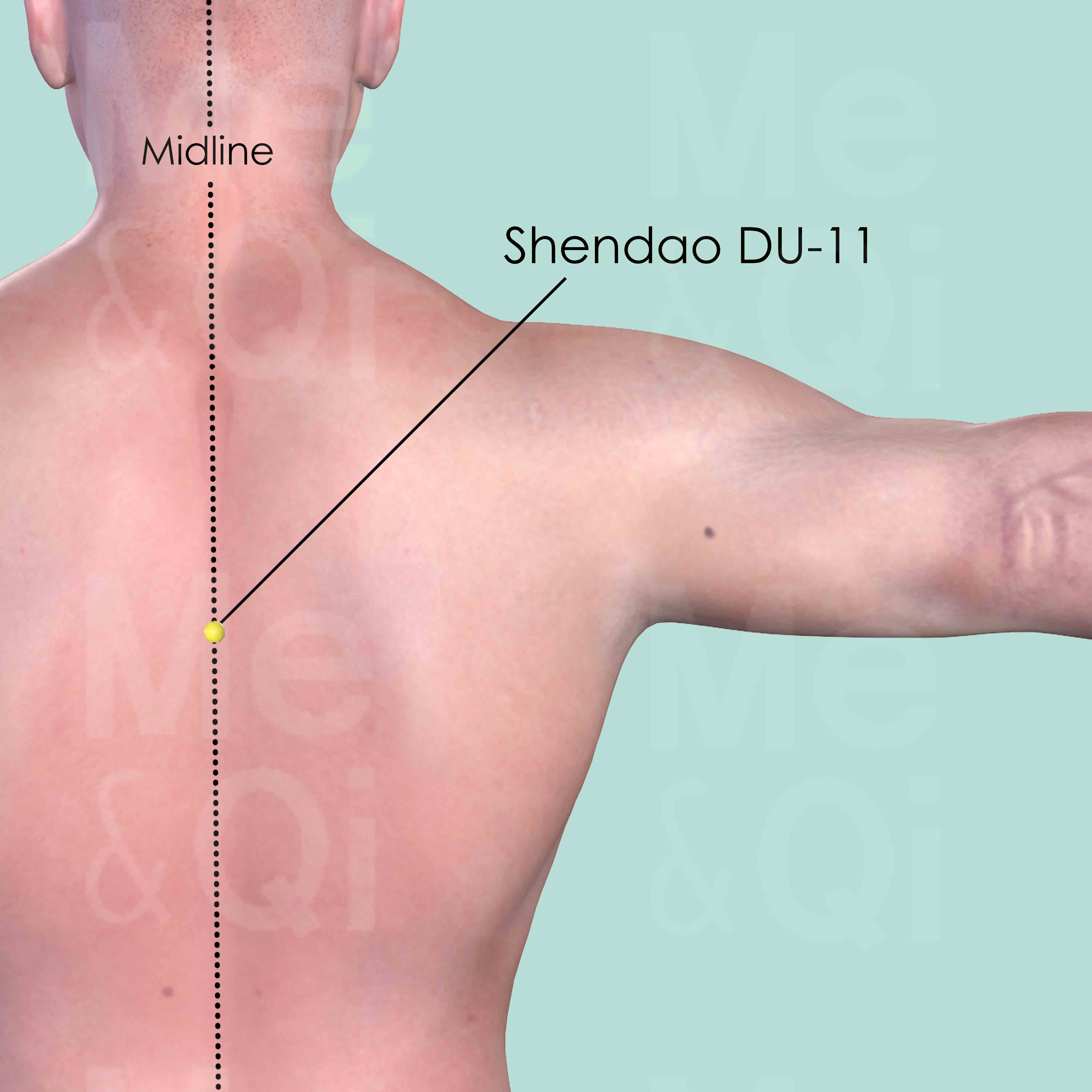
Shendao DU-11
On the back midline, in the depression below the spinous process of the 5th thoracic vertebra (T5).
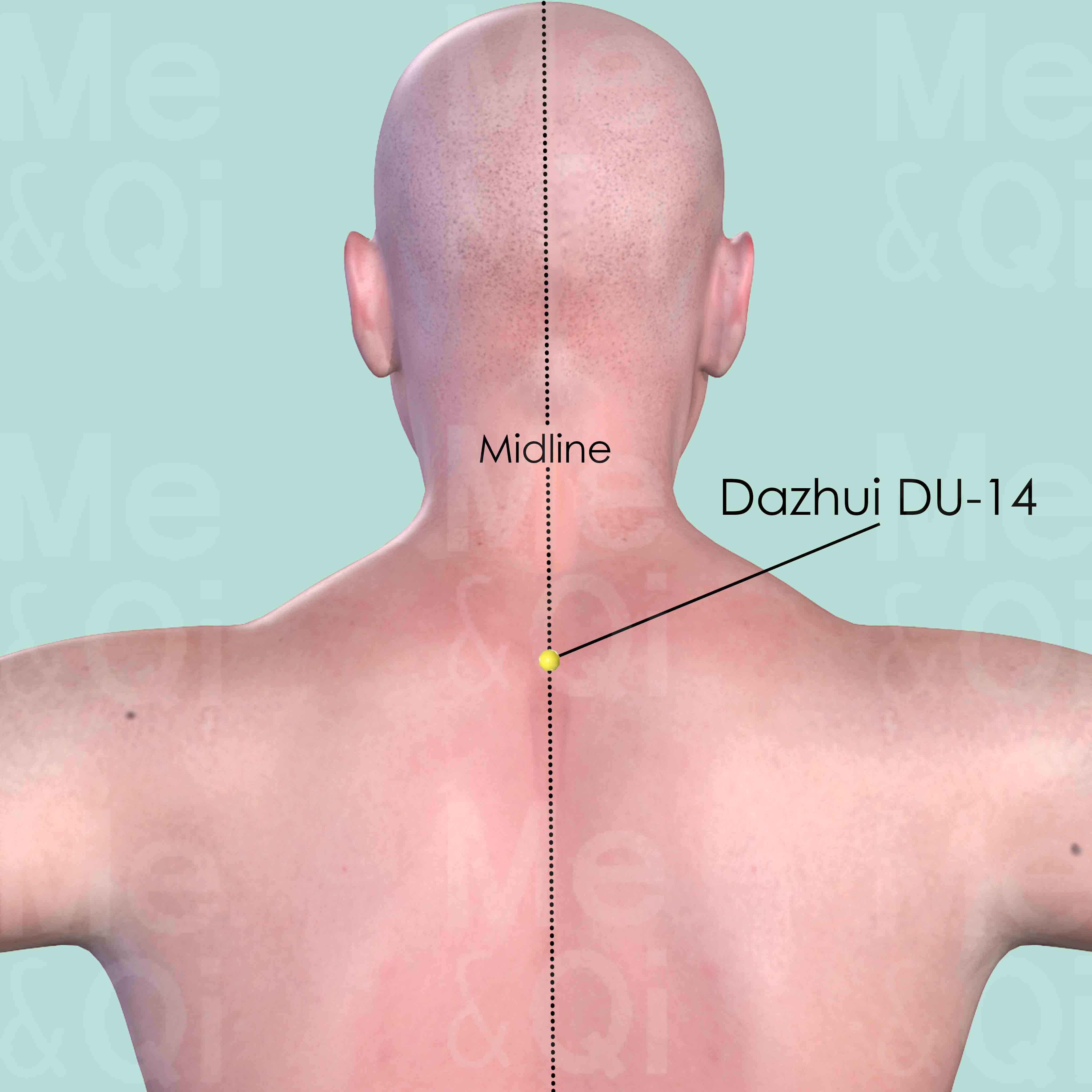
Dazhui DU-14
On the midline at the base of the neck, in the depression below the spinous process of the seventh cervical vertebra (C7).
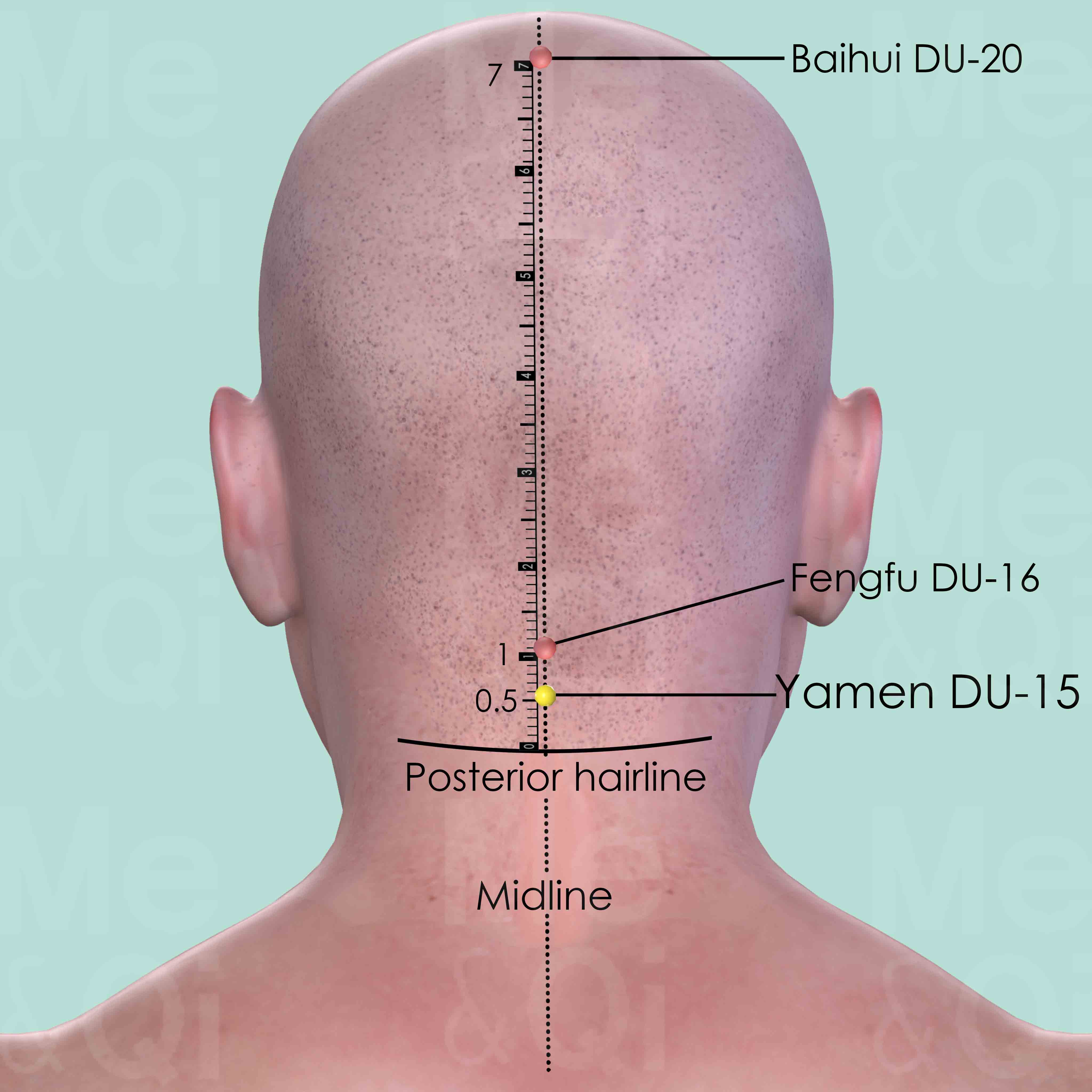
Yamen DU-15
On the back of the neck, 0.5 cun directly above the midpoint of the posterior hairline, below the spinous process of 1st cervical vertebra (C1).
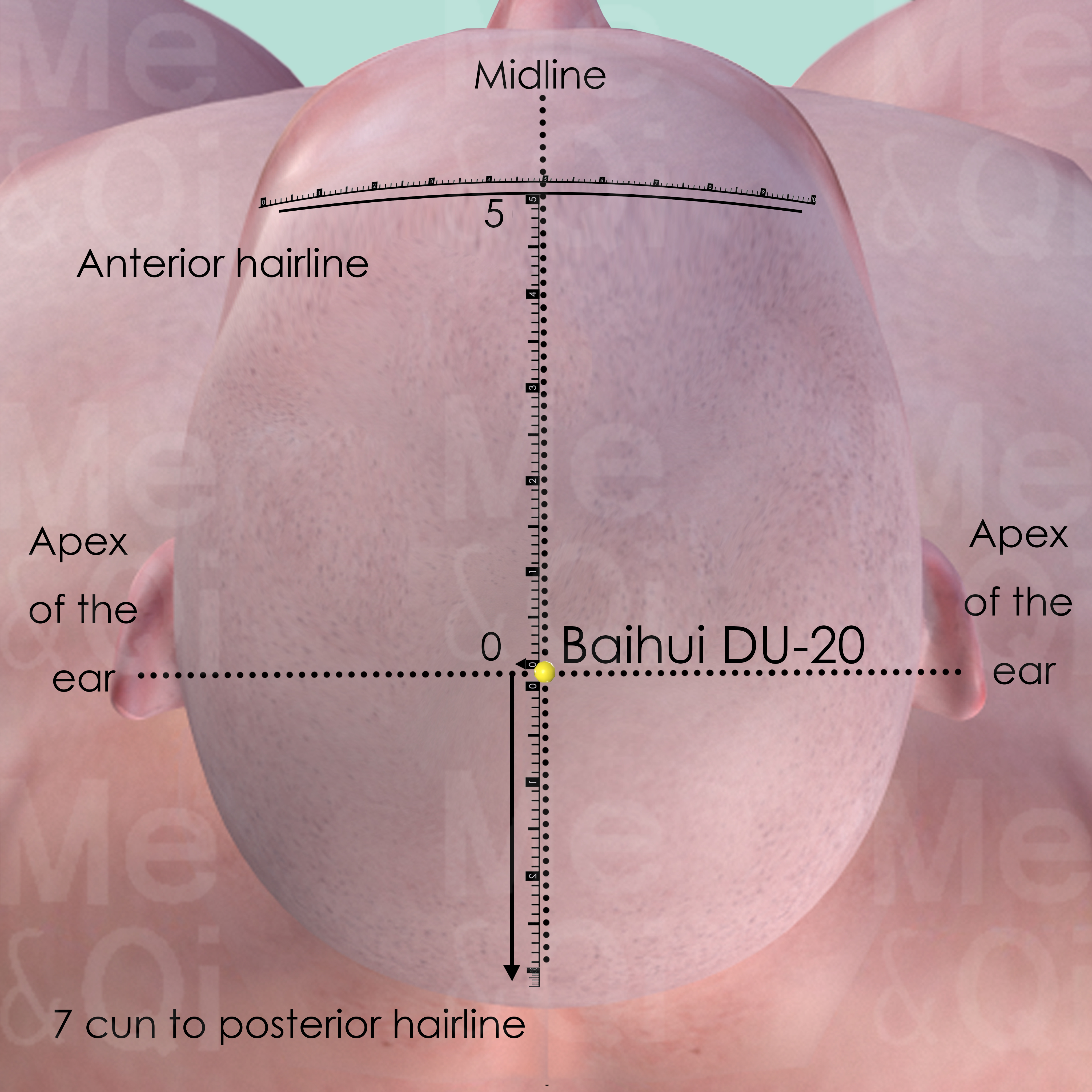
Baihui DU-20
At the vertex, at the junction of a line connecting the apex of the ears and the midline, in the depression 7 cun above the posterior hairline and 5 cun behind the anterior hairline.
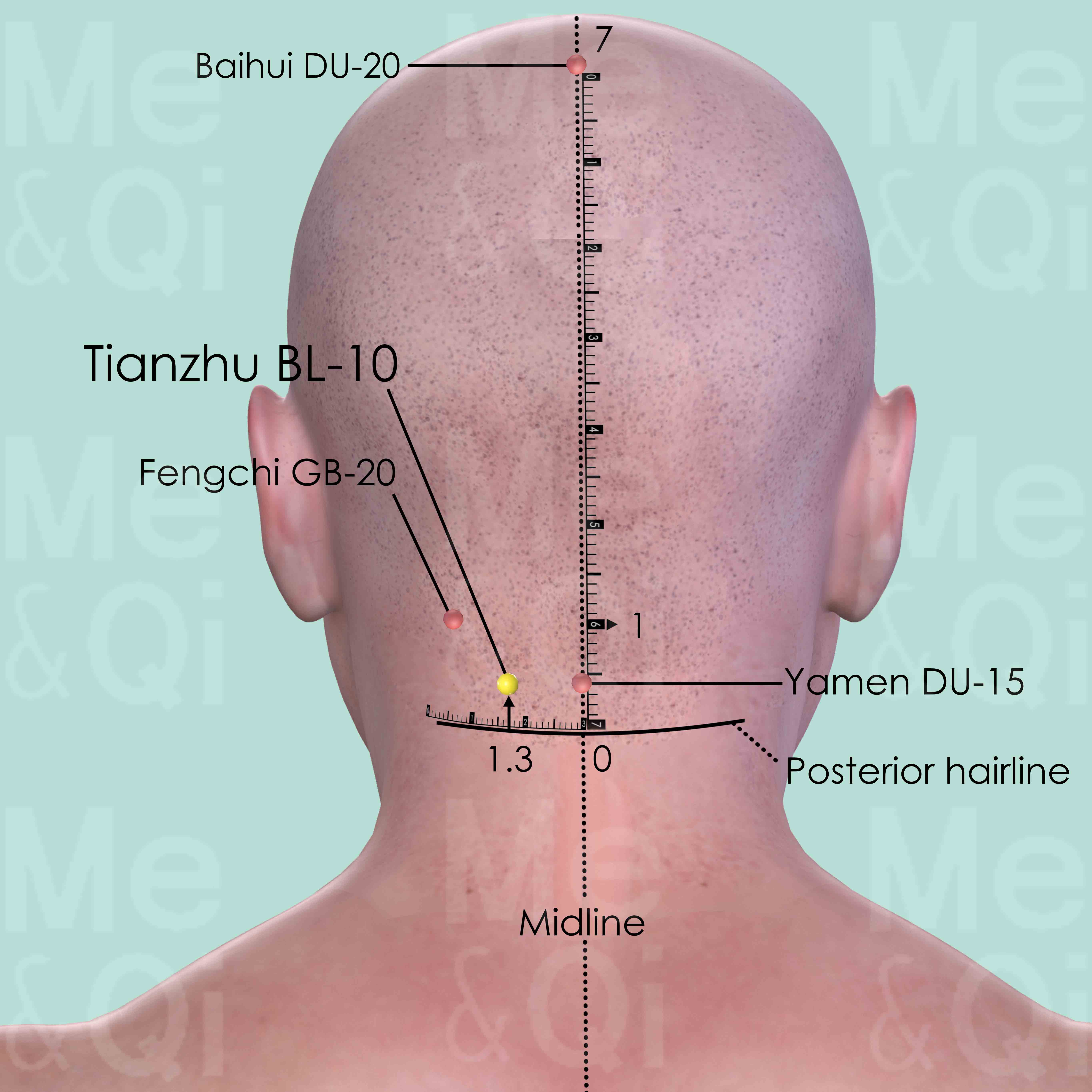
Tianzhu BL-10
1.3 cun lateral to Yamen DU-15 on the posterior midline, 0.5 cun above the posterior hairline, on the lateral side of trapezius muscle.
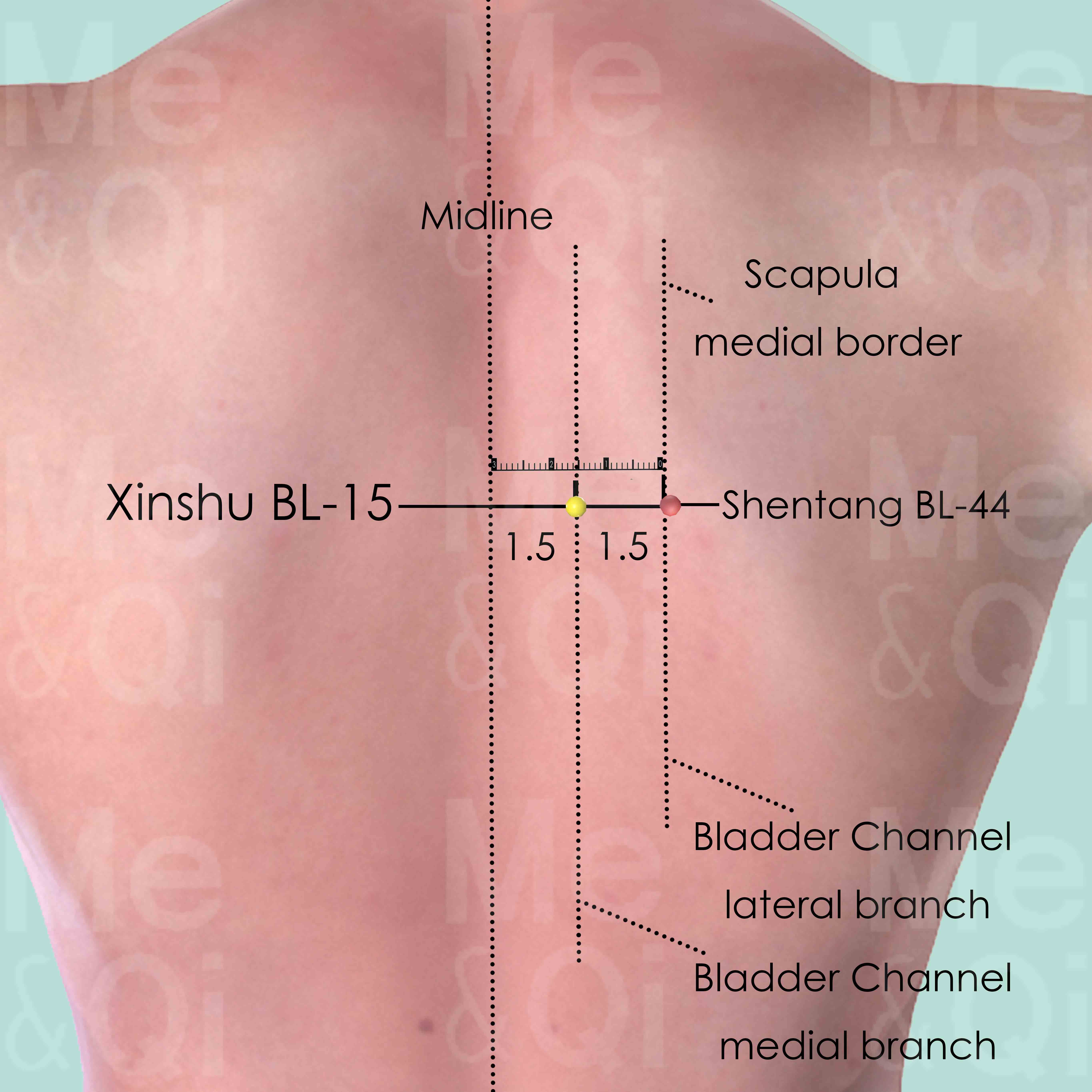
Xinshu BL-15
1.5 cun lateral to the lower border of the spinous process of the 5th thoracic vertebra (T5).
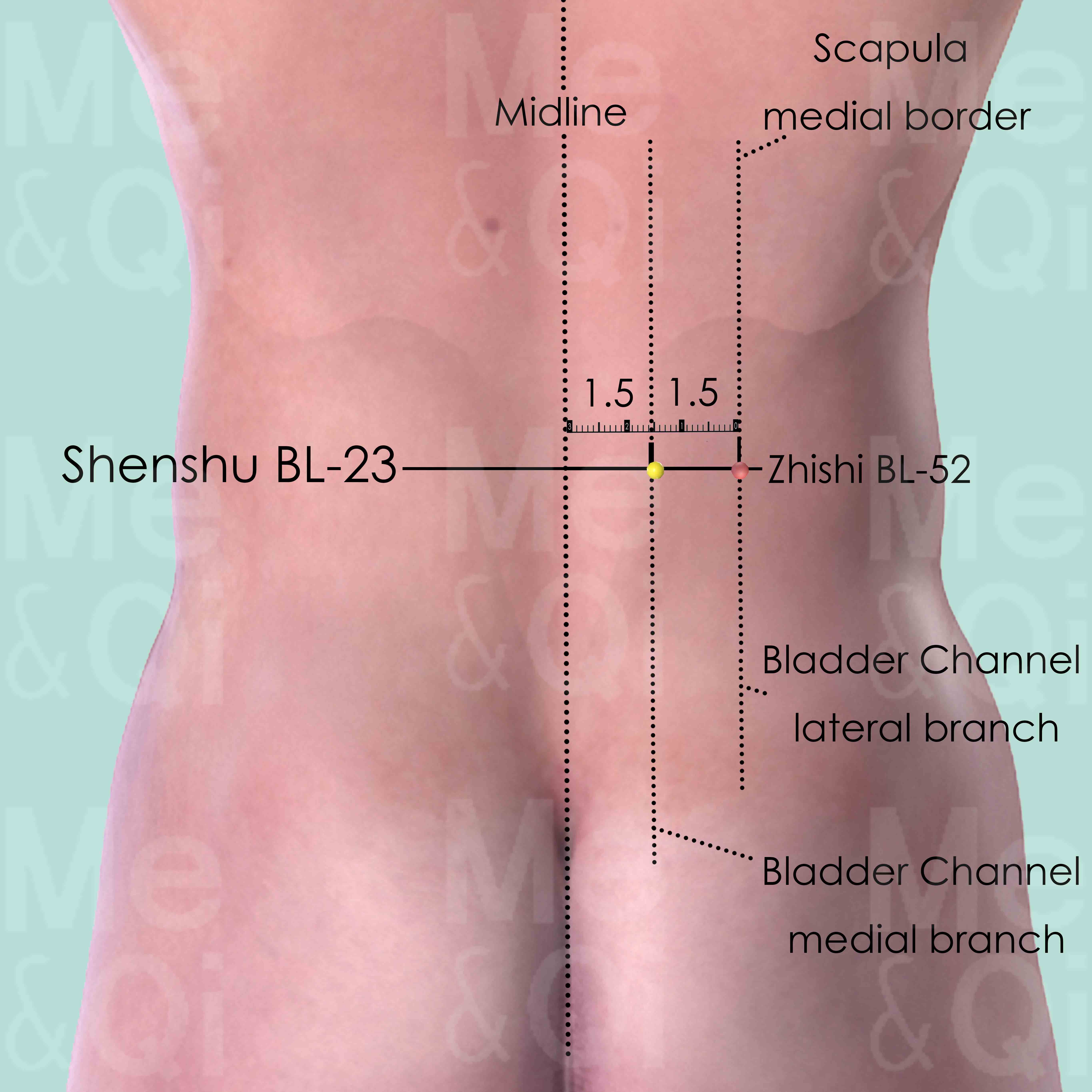
Shenshu BL-23
1.5 cun lateral to the lower border of the spinous process of the 2nd lumber vertebra (L2).
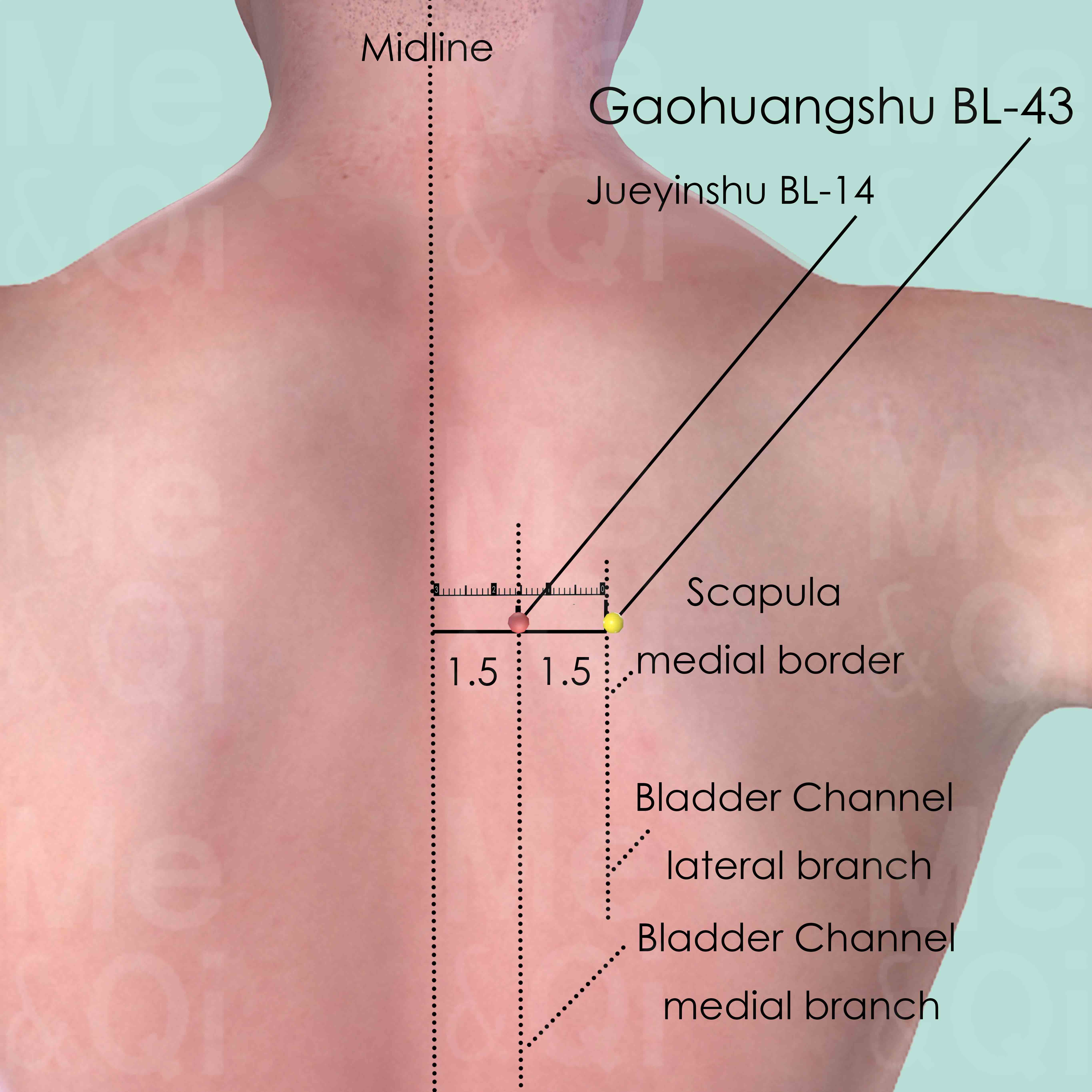
Gaohuangshu BL-43
3 cun (about 4 finger-breadths) lateral to the lower border of the spinous process of the 4th thoracic vertebra (T4).
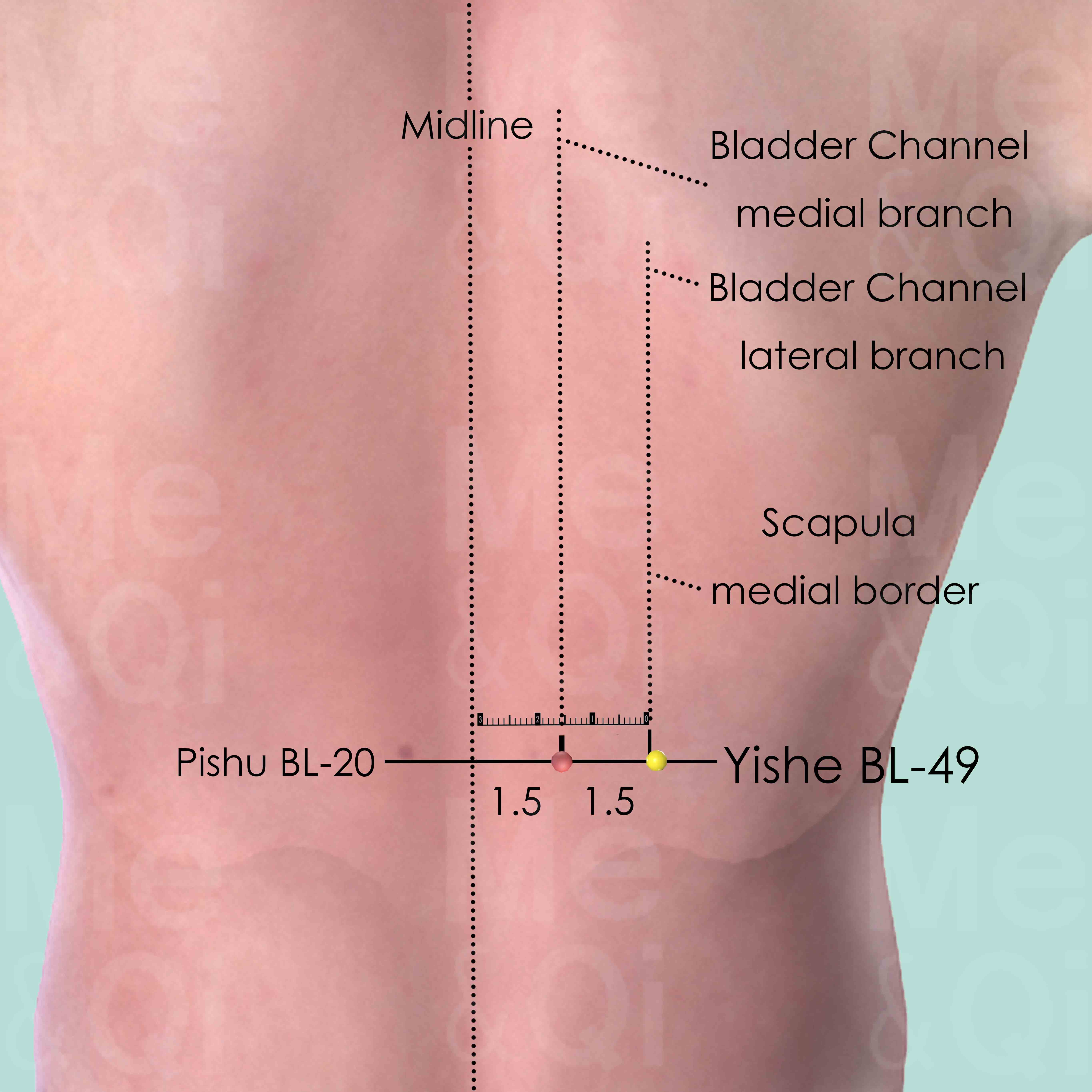
Yishe BL-49
3 cun lateral to the lower border of the spinous process of the 11th thoracic vertebra (T11).
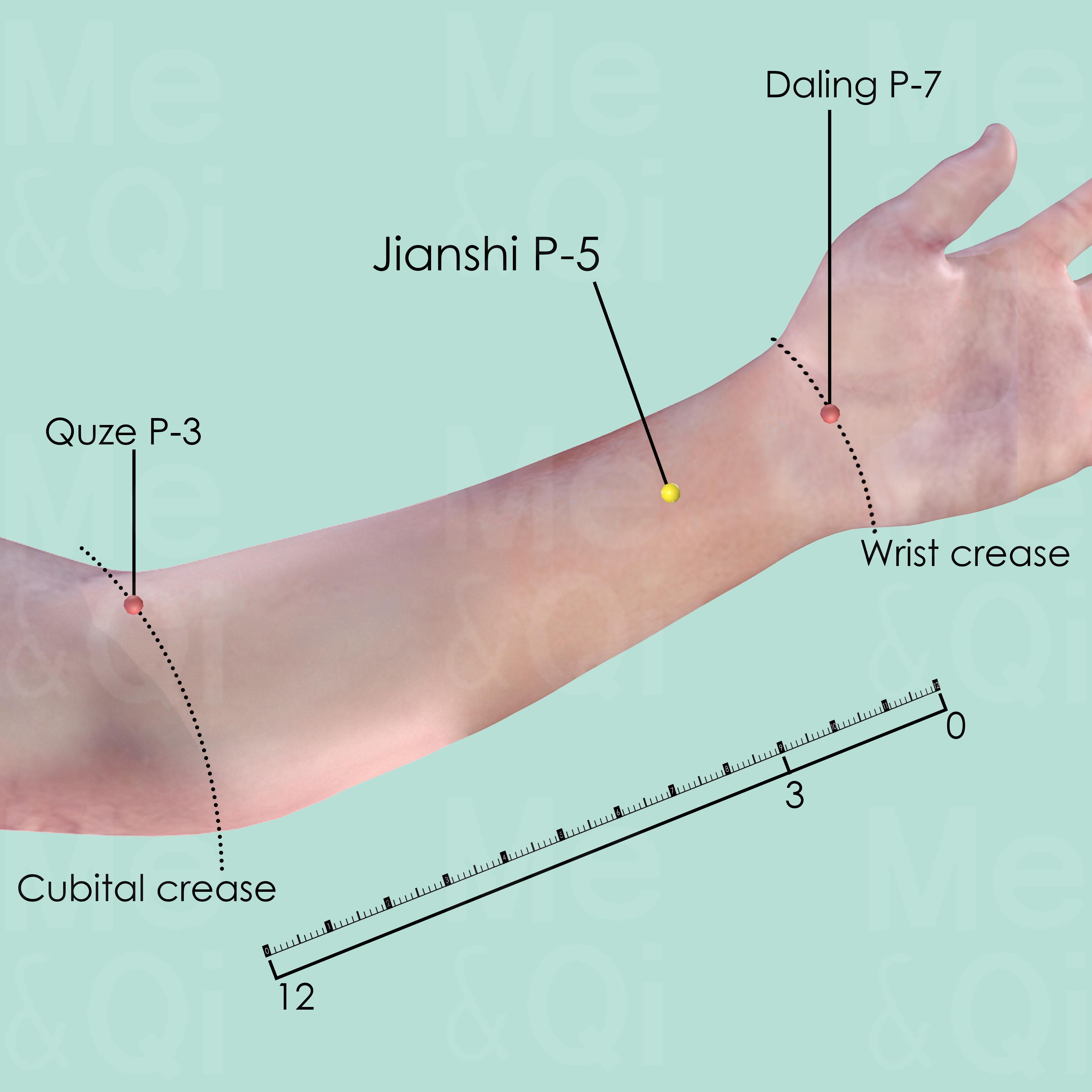
Jianshi P-5
3 cun above the transverse crease of the wrist, between the tendons of palmaris longus and flexor carpi radialis muscle.
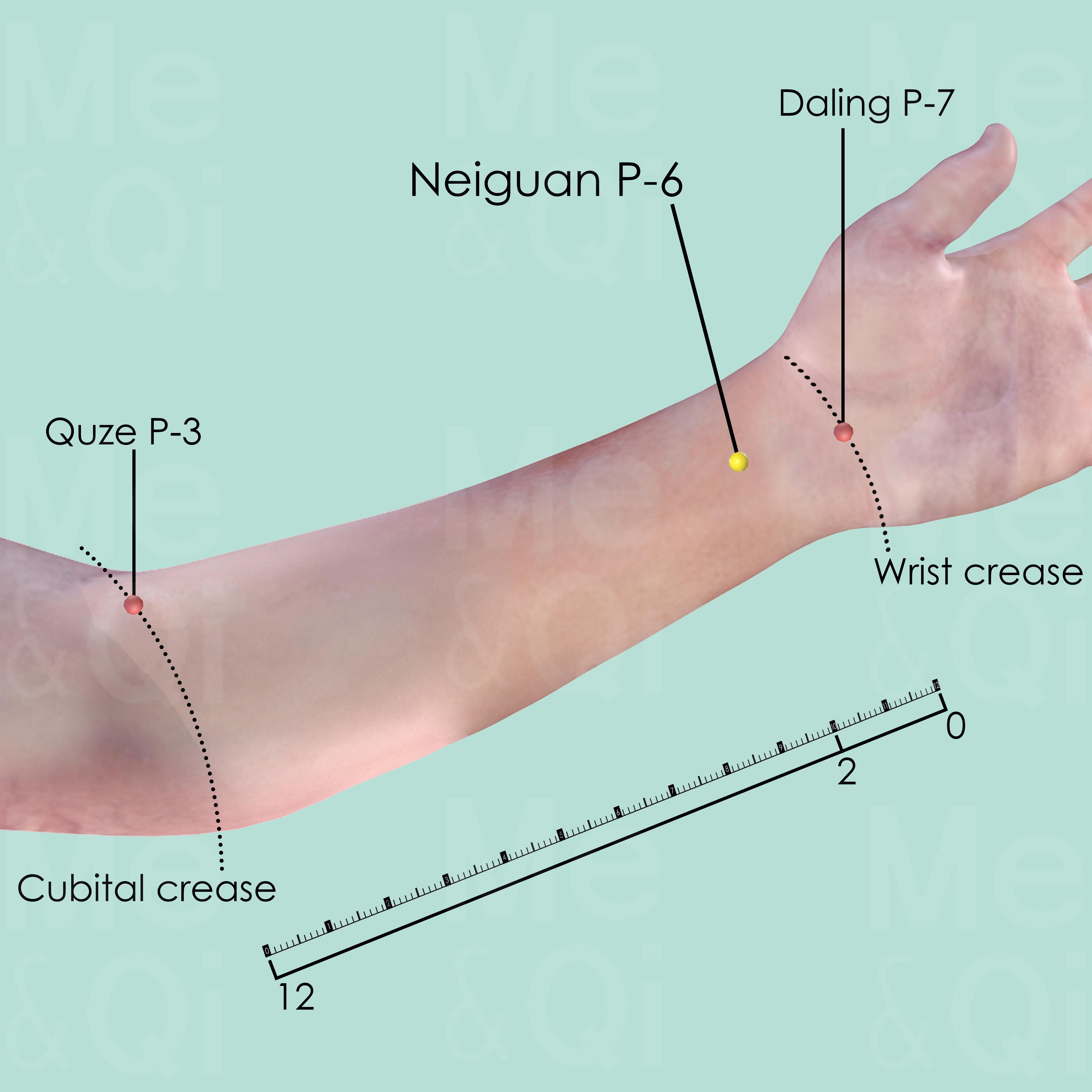
Neiguan P-6
2 cun above Daling P-7 on the transverse crease of the wrist, between the tendons of palmaris longus and flexor carpi radialis muscle.
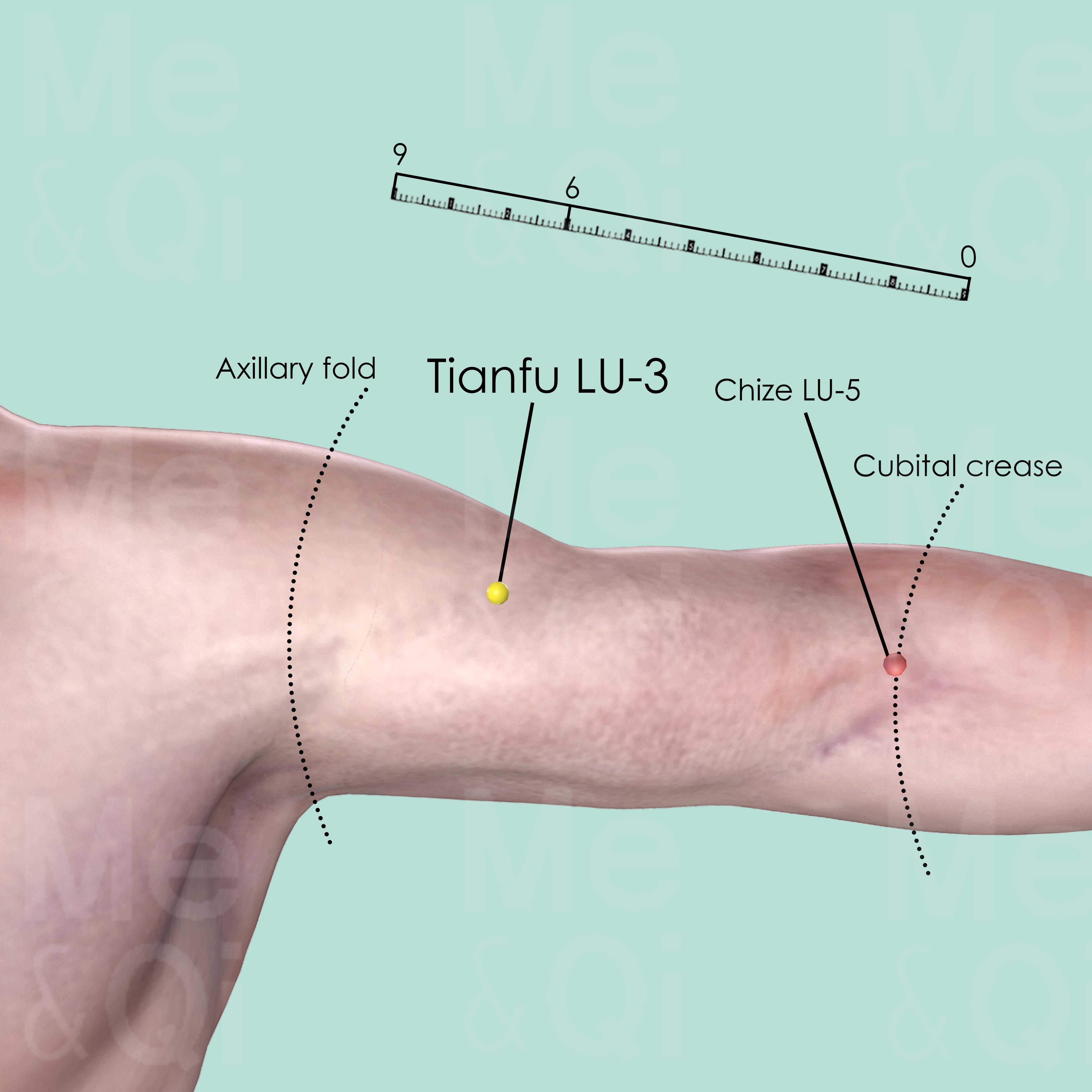
Tianfu LU-3
On the medial aspect of the upper arm, 3 cun below the end of the axillary fold and 6 cun above Chize LU-5, in the depression on the lateral border of biceps muscle.
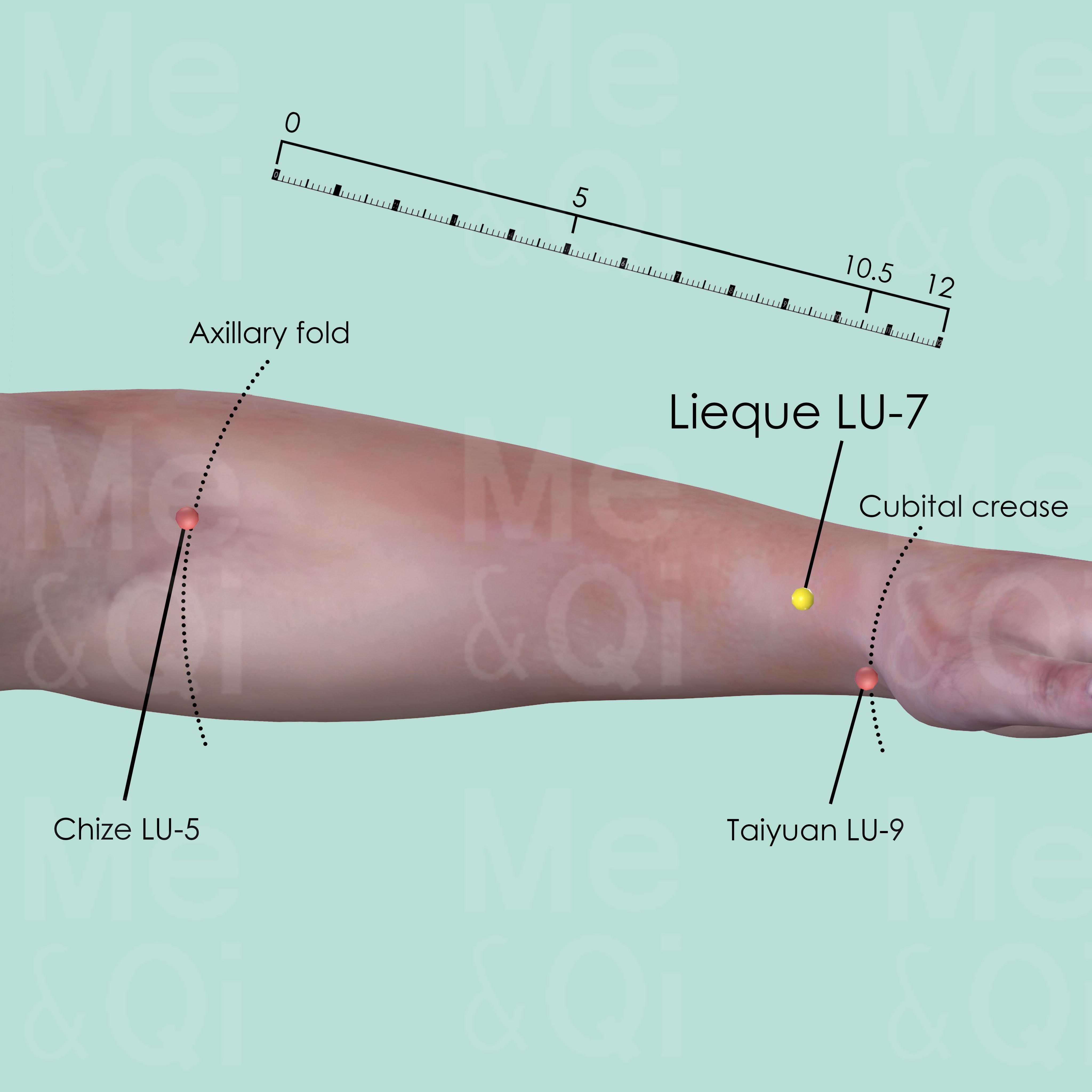
Lieque LU-7
Above the styloid process of the radius, about 1.5 cun proximal to the wrist crease (wrist joint space) in a V-shaped depression.
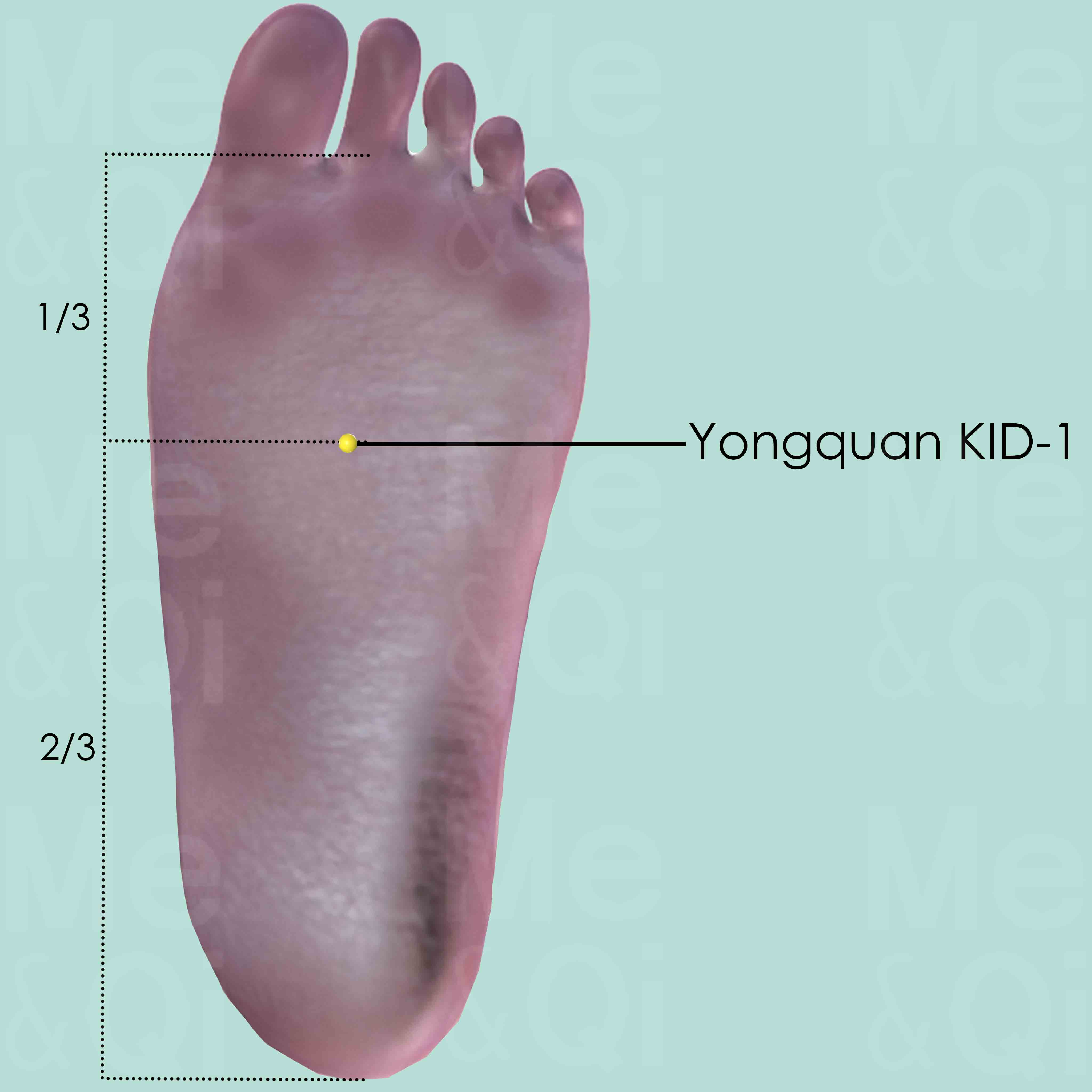
Yongquan KID-1
In the depression between the 2nd and 3rd metatarsal bones on the sole when the foot is in plantar flexion, approximately at the junction of the anterior and middle third of the sole.
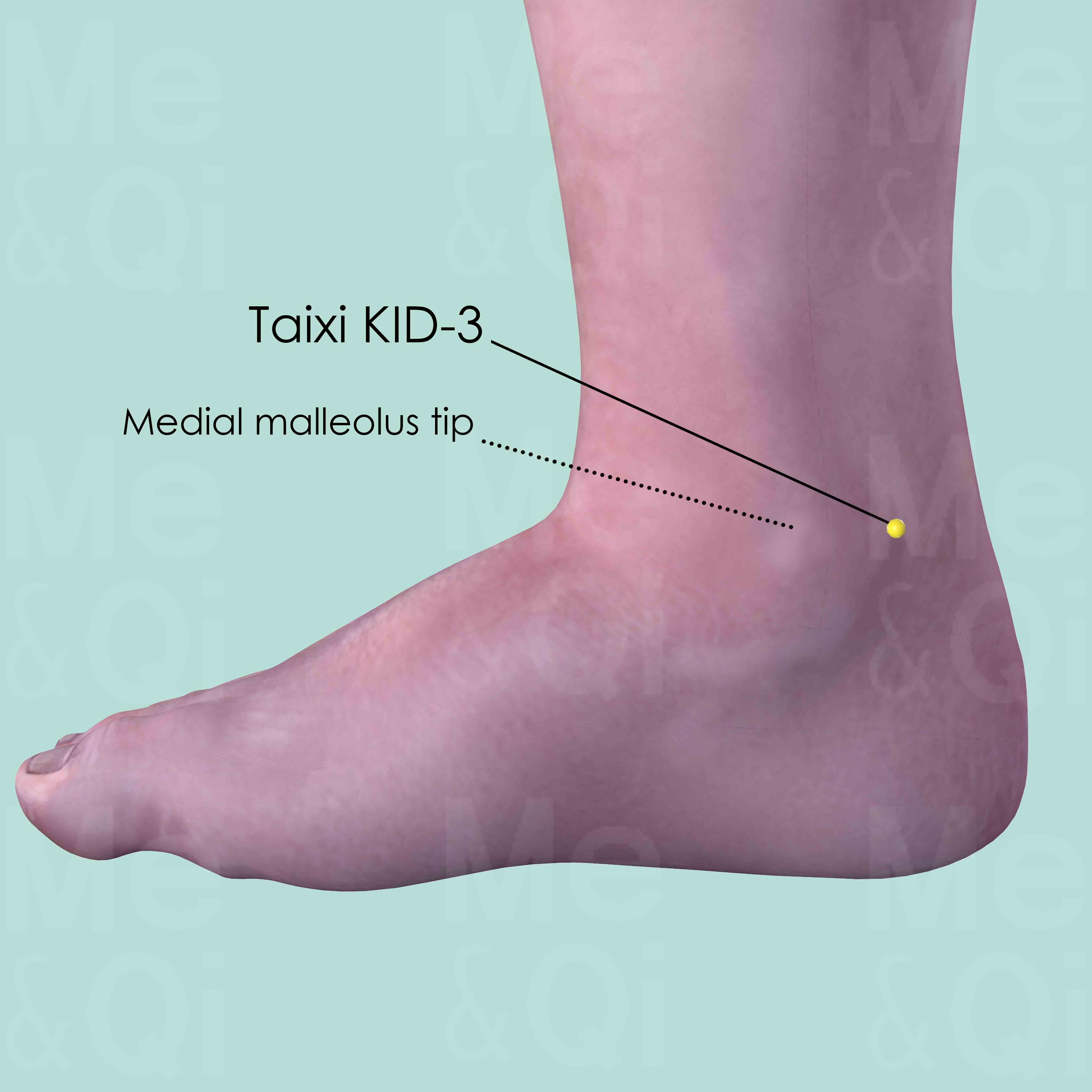
Taixi KID-3
In the depression between the medial malleolus tip and Achilles tendon (Calcaneal tendon), level with the tip of the medial malleolus.
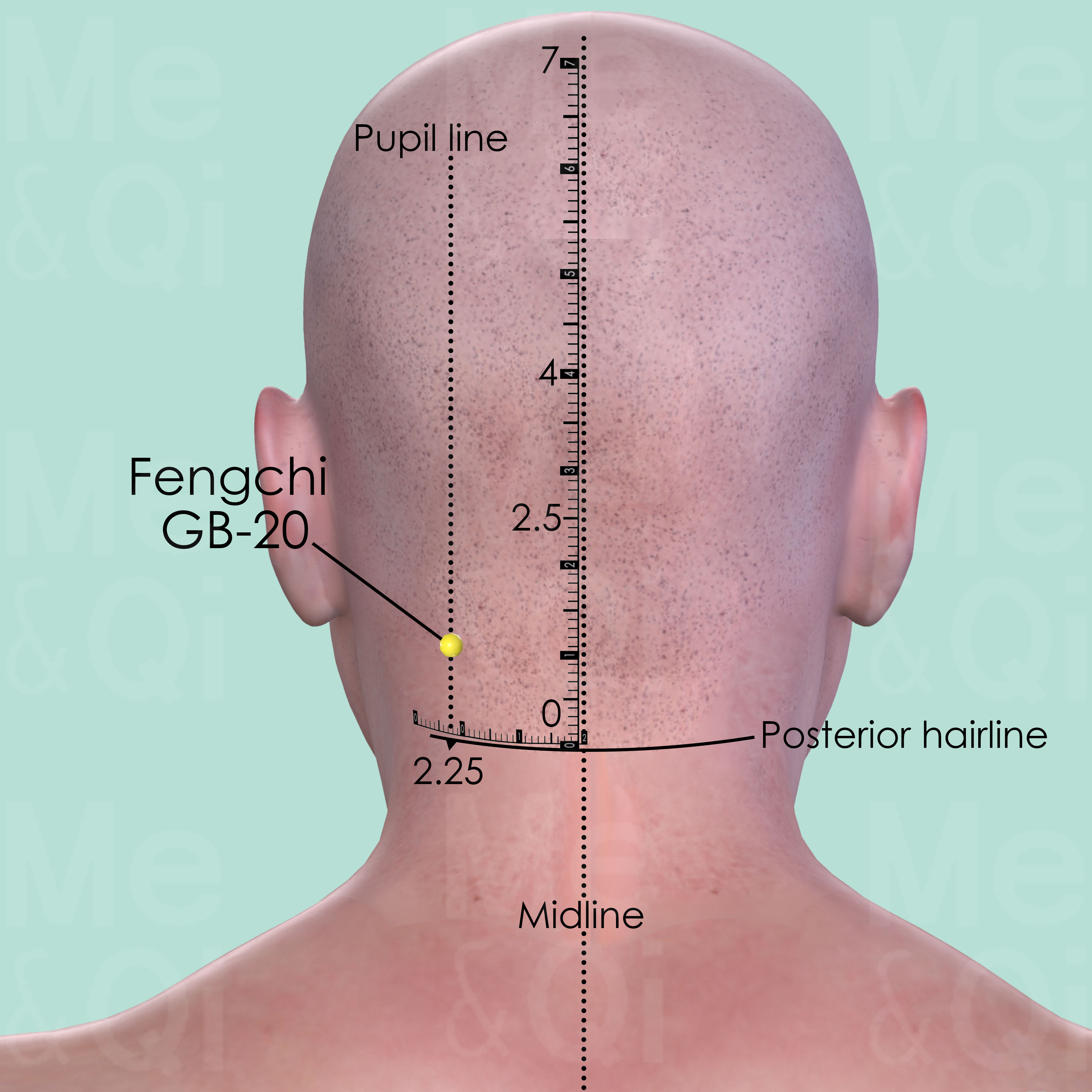
Fengchi GB-20
In the posterior aspect of the neck, below the occipital bone, in the depression between the upper portion of sternocleidomastoid and trapezius muscle.
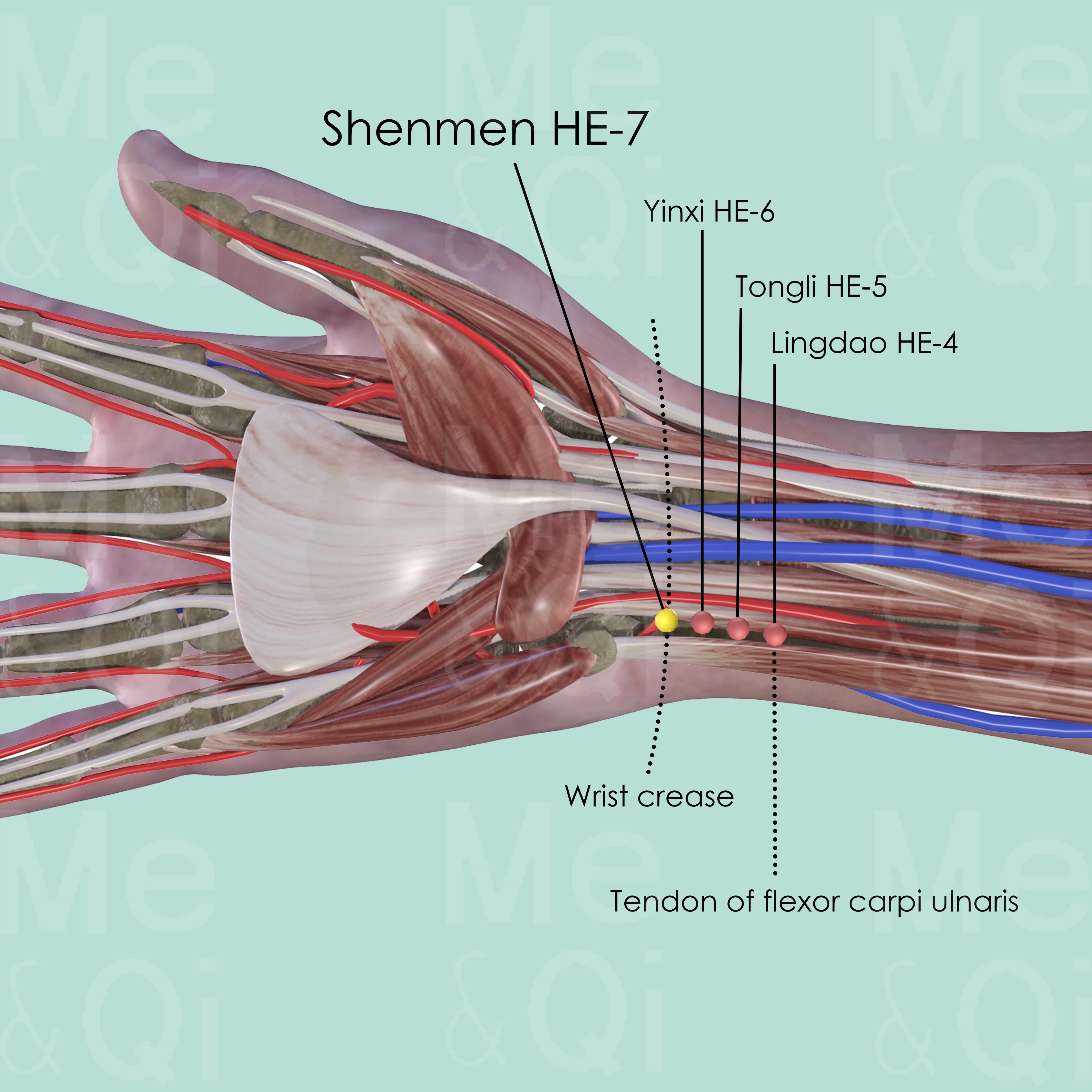
Shenmen HE-7
On the transverse crease of the wrist, in the articular region between the pisiform bone and the ulna, in the depression on the radial side of the tendon of flexor carpi ulnaris muscle.
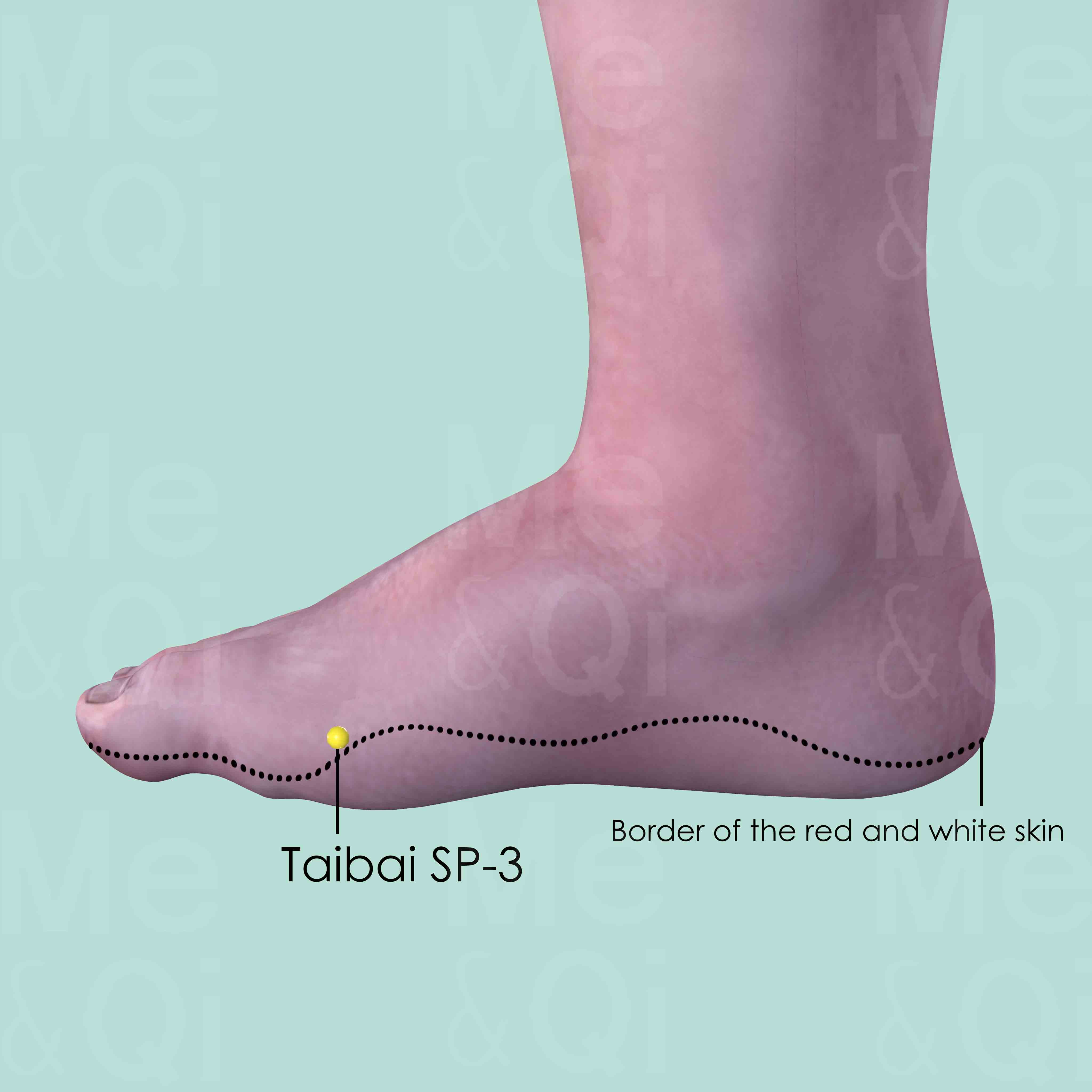
Taibai SP-3
Proximal and inferior to the head of the 1st metatarsal bone, at the border of the red and white skin.

